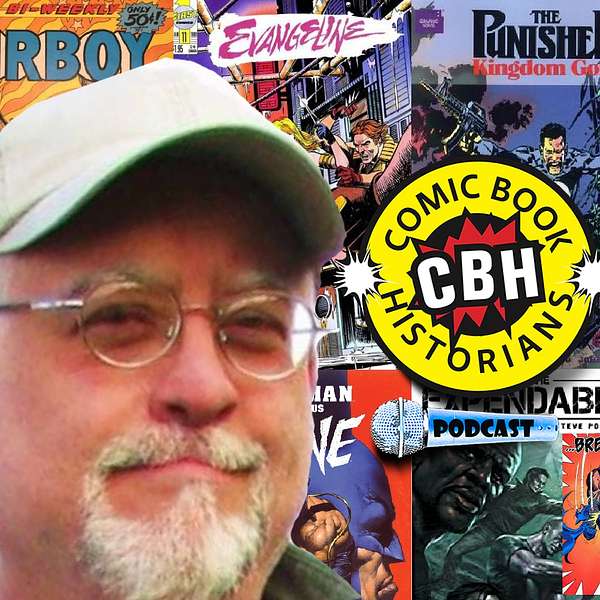
Comic Book Historians
As featured on LEGO.com, Marvel.com, Slugfest, NPR, Wall Street Journal and the Today Show, host & series producer Alex Grand, author of the best seller, Understanding Superhero Comic Books (with various co-hosts Bill Field, David Armstrong, N. Scott Robinson, Ph.D., Jim Thompson) and guests engage in a Journalistic Comic Book Historical discussion between professionals, historians and scholars in determining what happened and when in comics, from strips and pulps to the platinum age comic book, through golden, silver, bronze and then toward modern
Support us at https://www.patreon.com/comicbookhistorians.
Read Alex Grand's Understanding Superhero Comic Books published by McFarland & Company here at: https://a.co/d/2PlsODN
Series directed, produced & edited by Alex Grand
All episodes ©Comic Book Historians LLC.
Comic Book Historians
Chuck Dixon: Crime Comics Writer with Alex Grand & Jim Thompson
Alex Grand and Jim Thompson interview comic writer and 90s Batman thinktank, Chuck Dixon discussing his comic origins in the 80s independent circuit with Evangeline and Airboy, working for Archie Goodwin & Carl Potts on Epic & Marvel Comics, working with Denny O'Neill on Gotham City & the Batman comics of the 1990s creating properties utilized in movies, animation & Cartoons, leaving DC Comics for Crossgen comics, writing Simpsons & Transformers comics, his work with Sylvestor Stallone, and the more polarizing aspects of the author’s current projects, his collaborators and associations, and his views of the contemporary comics industry. Edited & Produced by Alex Grand. Images used in artwork ©Their Respective Copyright holders, CBH Podcast ©Comic Book Historians. Thumbnail Artwork ©Comic Book Historians.
Alex Grand: Welcome to the comic book historians podcast with Alex Grand and Jim Thompson. Today, we have crime comics writer extraordinaire, Chuck Dixon. He’s been in the comic industry for the past, close to 30 to 40 years since the mid-80s. Chuck, thank you so much for joining us today.
Chuck Dixon: Oh, thanks for having me. I’m looking forward to this.
Alex Grand: What we’d like to do is we’d like to go through your career. We’re going to start at the beginning. Jim is going to start off with your early days. So, Jim, take it away.
Jim Thompson: I know you were born in 1954. Where?
Chuck Dixon: Philadelphia.
Jim Thompson: Okay. And did you grew up in Philadelphia?
Chuck Dixon: Philadelphia and close by suburbs.
Jim Thompson: Okay. And were you a comic book reader?
Chuck Dixon: Oh, yeah. Comics were everywhere when I was a kid, and I was an avid comics reader, I guess collector. I had a huge pile in the basement.
Jim Thompson: Were you an early reader, in general?
Chuck Dixon: Yeah. Yeah.
Jim Thompson: It’s a common denominator we find.
Chuck Dixon: Mostly with the help of comics. Like most comic creators or like a lot of comic readers, I was sick a lot as a kid and I missed most of first grade. I was only in first grade for like 30 days. They allowed me to pass because I did so well with reading.
Alex Grand: Your glasses, so you’re nearsighted, right? You can read up close without your glasses?
Chuck Dixon: Yeah.
Alex Grand: That’s another common denominator, Jim, because Jim’s like that too. And I was like that before LASIK and all that.
Chuck Dixon: So, I was prescribed eyeglasses I was like, seven. You know, I read the comics right up to my face, which I guess immersed me in them further.
Alex Grand: That’s right. Yeah.
Jim Thompson: that’s almost exactly what my experience was.
Chuck Dixon: I remember actually being startled by a Thor story by the final panel on a page because I didn’t see it coming because I was holding the pace so close to my face.
Jim Thompson: So, what were you reading, which books, which lines?
Chuck Dixon: I love Marvel’s pre superhero monsters. And so I grooved right into the Marvel age. But yeah, I was Superman, Batman, Sergeant Rock, that kind of stuff and then Foxing Crow. I love Foxing Crow. Then I got into the Marvels. But you know, as you guys as comic book historians know Marvels were hard to find. You really had to hunt for them.
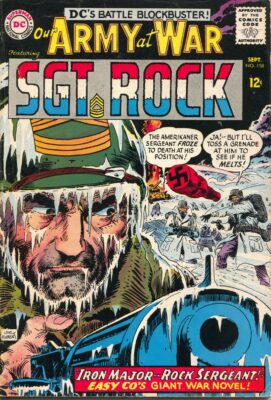
Alex Grand: Yeah, the distribution wasn’t as good as DC.
Chuck Dixon: Well, it was distributed by DC. I think that was the problem.
Alex Grand: That’s part of it. Yeah.
Jim Thompson: Now, did you later on go back and look at earlier comics, EC, for example, or the Golden Age stuff? Or did you kind of just start with the silver and go forward from there?
Chuck Dixon: Yeah, I kind of started with what was available. And my sister worked at a hoagie shop, I was from Philly, everybody worked at a hoagie shop at some point. And the owner’s son had a huge collection and he was a few years older than me. And he would let me borrow literally shopping bags filled with comics. So, I got to see a lot of like mid to late 50s stuff that appeared before I got interested. And then when I started going to conventions like late 60s, you got introduced to Golden Age and the EC stuff there.
Jim Thompson: So, talk a little bit about conventions and things. Were you involved in fanzines?
Chuck Dixon: I was part of a fanzine group from Chicago because there wasn’t one in Philly. I heard about these guys through the Comics Buyer’s Guide, and they were looking for basically comics stories to print. So, I wrote and drew my own stories for a fanzine called the Chronicle and another one called FBP. And I got to know those guys like through the mail, basically. I only met them a few times. So, a couple of times they came to New York, I met them there.
Jim Thompson: So, are there any comic book writers or artists that we would know that you established really early relationships with?
Chuck Dixon: Not really. I mean, not until John Burns first published work was in a fanzine I worked on. But by the time I met John, he was already working at Marvel. And he was so busy that he would literally when he went to comic book conventions, he would be working on pages at the conventions. Because I remember when I met him, the first time he was working on an Iron Fist story. I don’t think he looked up once while we were talking.
Jim Thompson: And when you were going to the conventions, did you meet people that were heroes of yours? Well, you listened to Alex Toth, I read an interview where you talked about that.
Chuck Dixon: Toth gave a keynote address at the first convention I went to. And basic story in the whole comic book industry, the interesting thing is that most of the audience for that were comic pros. And I sat next to Al Williamson, I didn’t know who he was until Alex introduced them for the stage. And you’re only cons, you rub shoulders with the pros more. I got to meet Neil Adams, Gil Kane, Gray Morrow, guys like that and they were just kind of hanging out.
Jim Thompson: In your work since you started doing comics, you’ve certainly done superheroes because you did Batman. But you haven’t done a tremendous amount of super superheroes, the ones with power is in the cosmetic kind of books. You tend to locate in Gotham City or in that kind of thing. Except for maybe CrossGen you were off-planet. So, my question is, was that true when you were a reader, did you gravitate toward things like daredevil or things that were more crime focused than the Marvel cosmic kinds of things?
Chuck Dixon: The strange thing is, I mean, Kirby was a given because Kirby was there every month with the cosmic stuff. He really didn’t think about, “Am I a Kirby fan?” He just read it because it was always there. Looking back I realized my God, that stuff was amazing. But at the time, it was just they set the standards so high, Kirby set the standards so high for cosmic stuff that he just sort of expected it to be wild. But I did gravitate more towards Batman, more towards Spider-Man, and as I said, Sergeant Rock. I remember when the comic magazine, his name is Savage came out, I was just thrilled to death because it was like a straight-up action thing with no superheroes.
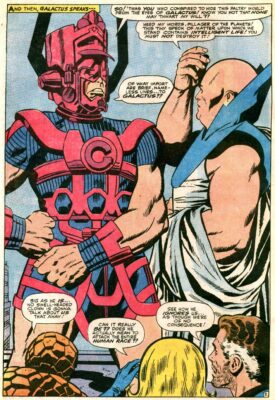
Alex Grand: You like that Gil Kane story a lot then when you first read it?
Chuck Dixon: Oh, yeah blew me away. I mean, it was great back in those days because you literally went to the newsstand not knowing what you were gonna see. I mean today we know everything that’s coming out months ahead of time. But you know, new characters, whole new companies would pop up that you’d never seen before. It was a cool time.
Alex Grand: That’s true.
Jim Thompson: You know, you’ve mentioned war titles, but you haven’t mentioned westerns. And the reason I ask is because some of my favorite things you’ve done, were like that Robin Annual that’s a Western and some of the other, and you seem to have a real affinity for spaghetti westerns especially. And I know, Evangeline, in the very first couple of issues, were basically a spaghetti western in style. So, were you interested in western comics, like Jonah Hex and that kind of stuff, Marvel stuff?
Chuck Dixon: Growing up, western comics were kind of tame. Looking back though, I have a huge collection of Dell westerns. I basically grew to appreciate them as an adult more than as a kid. I read them but they didn’t make any impression. Jonah Hex, yeah, big– The whole weird western thing with El Diablo and all the rest, they made a big impression on me. I really liked them because they were closer to the movies that I like.
Jim Thompson: Right. Right. Good. I was interested in that. So, now you’re graduating high school, you’re still into comics and fandom and things. What do you do next?
Chuck Dixon: I drew a lot of comics because I thought, well, I didn’t have an artist, but I just wanted to be part of this medium. I realized early on that I was not the next Gil Kane or Steve Ditko. But I still drew them because there was no one else to draw them for me. You know, I drew hundreds of hundreds of comic book pages, which I think helps me as a writer to understand what artists go through. I didn’t go to college. I just drifted from one dead-end job to another; drove an ice cream truck. I set pins in a bowling alley. That’s how old the bowling alley was. They didn’t have an automatic pinsetter. You know, I worked as a security guard, a janitor. I did advertising storyboards for a while as a freelancer. I worked in children’s books for a while as a freelancer. But all the time going up to New York trying to get interviews, and it was tough because Marvel wouldn’t see you at all. You could not get past the receptionist. DC would have, you could go on Wednesdays and just before lunch, they’d have a bunch of freelancers in to basically tell us that we were never going to get work there.
Alex Grand: This is the early 80s you’re talking about?
Chuck Dixon: the 70s.
Alex Grand: Late 70s?
Chuck Dixon: Yeah, like the DC implosion. I was going up after the DC implosion. They had laid off people so they weren’t looking for new people. As a PR thing they wanted to still talk to wannabes. They didn’t want to chase you away from the comics, but they would have Jack C. Harrison, Barbra Zacharias would sit in a conference room with us and just crush our dreams. It was an awful job. It’s like the doctor who has to tell the patient that they’re dying.
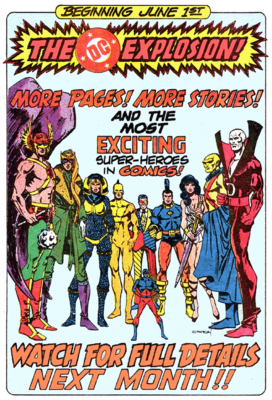
Alex Grand: Yes, yes.
Jim Thompson: Now before you actually started working in comics as a professional, you married an artist, correct? And that was Judith Hunt?
Advertisement
Chuck Dixon: Yeah.
Jim Thompson: Okay. When did y’all get married?
Chuck Dixon: I don’t remember the year, sometime in the 70s, late 70s.
Jim Thompson: Okay. And about how long were y’all married?
Chuck Dixon: Your Honor, we were married for four or five years.
Jim Thompson: Okay. And you have a son together?
Chuck Dixon: Yeah.
Jim Thompson: Did the two of you put together a package for Evangeline that was how you got your first actual paid assignment?
Chuck Dixon: It was something that had been kicking around in my mind for a while, and we presented it at a couple of companies. And then this company, Comico, popped up in Norristown, Pennsylvania, which wasn’t that far from where I was living at the time.
Alex Grand: Oh, that’s awesome. Yeah. Okay.
Chuck Dixon: They were a bunch of young guys, a bunch of young upstarts, you know, really not ready for primetime and here we were laying on them a completely realized, you know, professionally presented comic book and they went for it.
Alex Grand: That’s awesome because we had like Joe Staten on who got through into comics through Charlton, it sounds like later on Charlton’s not doing that stuff, but you’re right by Comico and that was like kind of how you got and that’s awesome. There needs to be something like that in comics, some outfit like that now, but that’s great that they had that then.
Chuck Dixon: Yeah, yeah. And they weren’t at all corporate. You just knocked on the door, you know?
Alex Grand: Yeah. Yeah.
Jim Thompson: Give us a couple sentence summation of what Evangeline is. It’s a fascinating concept.
Chuck Dixon: Well, it’s a futuristic story, a science fiction story, you know, space opera, planet hopping thing. It features Evangeline who is a nun with the church and she’s sort of a spy for the Vatican. I read a series of paperbacks called The Inquisitor, there were written under a pseudonym by Martin Kruse Smith. And they were about basically a James Bond who works for the Vatican. And he has a sort of dispensation to kill, as long as he does penance afterwards. I mean, it was a great series. It’s a great series. It really, it’s in that men’s adventure paperback genre. But to me, it’s like literature. Each novel was really terrific; anyone wants to try to find them. And so that was a big influence. And then I just sort of transplanted it to space because that was more saleable to comics.
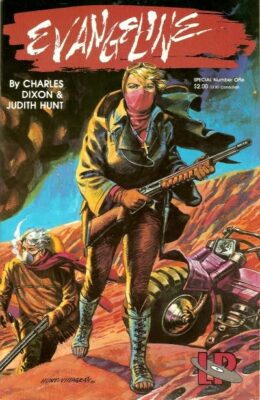
Jim Thompson: Now, did the two of you co-write it, or did you write it and she drew or painted it?
Chuck Dixon: Yeah, I wrote it. She drew it, and sometimes I provided layouts.
Alex Grand: Oh, cool.
Jim Thompson: Okay. I’m curious, because then what happens with it? Because I know two issues come out. And then at least according to Wikipedia, there’s an ownership dispute or something that developed. Can you tell us about that?
Chuck Dixon: Well, they claimed it was worked for hire and nothing in our contract said that, although in the contract it wasn’t really spelled out, so we had to go to arbitration. And we made our case and we won, we won ownership.
Jim Thompson: Well, that’s great.
Chuck Dixon: Comico was pretty bent out of shape about it, but it’s like this is early on in the creator-owned game, and they didn’t seem to get it. They just seem to think that they took the risk in publishing, and they were rewarded with sales. So, you know, the big proponent of owning stuff, still am.
Alex Grand: Yeah, that’s great.
Jim Thompson: Right out of the gate, the very first thing that you get published, you end up in arbitration and have to get lawyers over it?
Chuck Dixon: No, we didn’t get lawyers. We just presented the case ourselves. It was in front of arbitration. It was a sit in a conference room.
Jim Thompson: Oh, that’s great.
Chuck Dixon: They made their case, we made ours and the arbitrator went with us.
Jim Thompson: And there was two issues in a story in Primer, is that right? So, three stories altogether?
Chuck Dixon: Right.
Jim Thompson: And they get packaged by Lodestone.
Chuck Dixon: Yeah, I don’t remember. Some guy approached us. I don’t know who he was and offered to put them together and like one bumper addition.
Jim Thompson: And you go to First a few years later and pitch it as a new series. Is that what happened?
Chuck Dixon: Yes, yeah.
Jim Thompson: And you’re still married at that point?
Chuck Dixon: No.
Jim Thompson: Oh, she still worked on the series for the first couple of issues, right?
Chuck Dixon: Right. Right.
Alex Grand: That’s good.
Jim Thompson: Was that difficult working to…
Chuck Dixon: Yes. Yes, it was because I wanted to go to Eclipse where we would have remained creator-owned, and then First offered almost exactly the same deal, but no creator ownership. But we were going through the whole divorce thing and I just sort of gave in. I just didn’t want to have any more discussions about it. So, we went with First so we lost all rights to it. You know, it’s tangled up with about a bajillion lawyers that ended up owning everything at First.
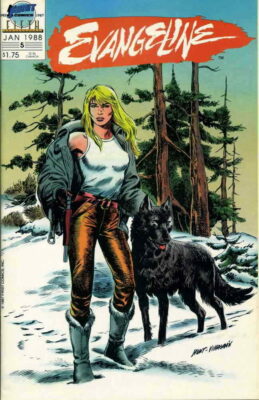
Jim Thompson: So, to this day, you don’t have ownership of it?
Chuck Dixon: No. A lot of those first properties are in question, and Evangeline is one of them. Nothing will ever get done. I mean, it’s like, so many times movie producers have been interested in doing it for a movie or television, and there are so many people that want money from it that it’s not worth doing because everybody wants to be paid.
Alex Grand: Yeah. Staten actually said he got partial rights to E-Man, but it’s still partially also owned by someone from First as well. So, I remember that came up.
Chuck Dixon: Well, Mike Baron got everything back from them.
Alex Grand: Like Badger and Nexus and those things?
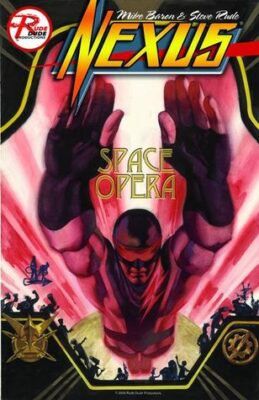
Chuck Dixon: Yeah, yeah. They don’t own them.
Alex Grand: Yeah. All right.
Jim Thompson: I read somewhere that there was some discussion of you or you and your son doing some news stories. Did that ever come to fruition? Or was that not true?
Chuck Dixon: That’s not even accurate. No, nothing like that ever happened.
Advertisement
Jim Thompson: Yeah, there’s a lot of things out on the internet that…
Chuck Dixon: Oh, yeah. I think almost everything on the internet is fact (sarcasm)
Jim Thompson: I also read something that your ex-wife said that she thought that after she stopped co-writing it that it suffered a lot and became a less interesting, less feminist character. Did you see where it went in any different direction after she left drawing the series? Did y’all have conversations about that?
Chuck Dixon: No, no conversations about it. And I think it definitely went down in quality, the art suffered. But yeah, a bunch of guys on it who would later be terrific comic talents, but were, you know, they were using it as a tryout book. At first was I kind of indifferent to it in the beginning, and my only help was that Ricardo Villagran stayed on for a while. I think one of the editors kept fighting with me about it. They kept changing editors. That’s always a bad sign when they keep changing editors. It only ran 12 issues. I think I had five editors. So, yeah, it was difficult to maintain the quality. As far as you know, feminist angle, I never saw it as a feminist comic anyway.
Jim Thompson: I see. So, you guys just had a difference so… Well, you probably had differences of opinions on a lot of things that’s why you–
Chuck Dixon: almost on everything
Jim Thompson: I knew she was involved in something called Robotech Defenders and did some Winnie the Pooh workbooks. She was primarily an artist. So, did you contribute to any of the things, other projects that she was working on when y’all were married?
Chuck Dixon: I wrote the Winnie the Pooh books. And I remember the Robotech job, but I wasn’t involved with it.
Jim Thompson: Okay. I see. So, your first two experiences in terms of with Evangeline we’re complicated in terms of…
Chuck Dixon: To say the least.
Jim Thompson: And you also started working at Eclipse on Airboy beginning in what, 1986?
Chuck Dixon: Yeah, yeah 86.
Jim Thompson: Okay. Were there any things in between that or was Airboy the next thing that you did after Evangeline?
Chuck Dixon: Yeah, pretty much. The next thing I did was I met Tim Truman who was working at Eclipse. And he was living again, not far from me. So, I was running into him at like, local comic shop appearances and stuff like that.
Alex Grand: Oh, that’s awesome.
Chuck Dixon: He talked about Eclipse and Kat and Dean, so I began submitting things that are anthology titles, Alien Encounters, and Tales of Terror. And early on, Kat, in particular, she liked my stuff. So, I just happened to be at Tim’s when he got the phone call about Airboy because it was in public domain and they thought, well, here’s a superhero we can do, an established superhero thing we can do that we don’t have to pay rights for. And when I heard Airboy, I said, “Can I get on this phone call?” Because I loved Airboy. I knew him from Steranko’s history of comics, and also Airboy Golden Age issues were relatively cheap. So, I actually had a lot of them that I bought in the 70s because Airboy sold so well people don’t realize this. Airboy sold on a level with Batman and Superman comics. So, there were always plenty of them around. They were never scarce, so they were easy to find. So, I was really familiar with Airboy. And basically that’s how I got the job. I was the only comic writer out there who knew who the hell the character was.
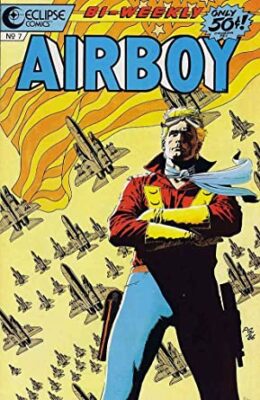
Jim Thompson: Tim Truman did the art on what, the first couple of issues?
Chuck Dixon: The first two of them, and he was my editor for like first 20 issues, maybe.
Jim Thompson: And Tom Yates had some involvement too, didn’t he? Was he drawing on it?
Chuck Dixon: He was doing the inks. He was doing the inks.
Jim Thompson: Okay. And after just a few issues, Stan Woch?
Chuck Dixon: Yeah, I believe it’s Woch, yeah.
Jim Thompson: He came on board and he was the primary artist on the title for the longest run. Now, that was an interesting book. I remember to this day, the letters pages and all of the back and forth and everybody was angry over that book, but people were reading it. Talk about the format a little bit because it was unusual. It was a very short every other week when it was first released and for a cheap price on key paper, and you were writing what, 13-page stories or something like that?
Chuck Dixon: 14-page stories, yeah.
Jim Thompson: And you hadn’t written that many books. So, that probably wasn’t as weird to you as it might be to somebody that had been writing for 10 years. But how did you adapt to that page, count, and do it what you were doing?
Chuck Dixon: I was running on around like 110% enthusiasm at that point. I was working as a security guard for a big insurance firm. I worked nights and whenever I got assigned to the desk, that’s when I wrote Airboy. And I just write it out on legal pads. I didn’t type, I had a typist that I hired. She worked for like 50 cents a page until I got so busy she quit. She couldn’t handle how prolific I was. Because I got this assignment, this like regular comic assignment. I was so excited. I got so far ahead on scripts, because like I said, it was all just enthusiasm. As you said, the 14-page format didn’t bother me because, okay, that’s what I’m doing now. I think Dean wanted to have like five chances to make a first impression, that’s why it was a biweekly comic. You just get it in everybody’s faces as quickly as possible and as much material as possible. But the thing is, it made it a 28 page monthly as a matter of fact.
Jim Thompson: Almost immediately, one of the issues about Airboy that was odd was that they thought out the Valkyrie character and basically, she wants to sleep with Airboy because he looks like his dad who she had a relationship with.
Alex Grand: Tthat’s the set up for a lot of online movies now actually, yeah.
Jim Thompson: How did you deal with that?
Chuck Dixon: Well, only at Eclipse could we have done that story at the time. The idea was that we wanted to recreate the Airboy from the Golden Age. But of course this was the son of the original Airboy. But we wanted to have that sexual tension between Valkyrie and Airboy and it’s like, okay, well, let’s just short circuit it. To Valkyrie, she sees no difference. This guy looks exactly like the guy looked at when she went into suspended animation. So, why not pick up where she left off even though it’s not the same person? And that quirkiness, well, at the time, you could only get away with in comic books and only get away with at Eclipse. It just fit the company, fit the time period. It certainly creates sexual tension. That’s kind of weird.
Jim Thompson: Yeah.
Alex Grand: Yeah, it’s cool. I could get into reading that again. Yeah.
Jim Thompson: So, in terms of a lot of people, especially in our Facebook group, there’s people always saying, why comic books are too political today, or they’re talking about you shouldn’t bring in references. And you know, you’ve made comments yourself. But Airboy was an incredibly political book as the letter page reflected. How was that to do considering that you guys were all coming from very different places with Truman in one place, Kat way over on in another place, and you as what you were describing at the time is a Barry Goldwater style Republican?
Chuck Dixon: It was interesting. I had a lot of phone calls with Kat that had nothing to do with comics. And I can’t say we ever argued. We never argued and we really didn’t argue. But she got really angry with me over the Afghanistan storyline in Airboy because I presented some of the Mujahideen as heroic fighting the Soviets. She was like, “Well, don’t you know what they’re about and everything else?” Which okay, it’s pretty appreciate of Kat. But it’s like, yeah, I know they’re not all good guys. But, they’re like pirates. We know pirates aren’t nice people, but we romanticize them.
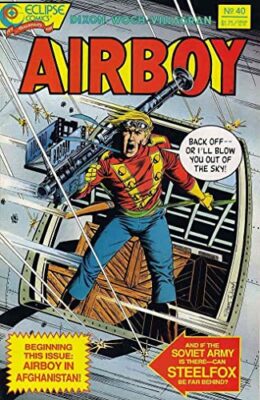
Alex Grand: Yeah. It’s almost like Barbary pirates on land. Right?
Chuck Dixon: Yeah. Yeah. So, I like okay I get what you’re saying. But she was angry at me because I was presenting them as, you know, and some of them were heroic till the Taliban killed them. So, we had a lot of discussions and I think a lot of the interesting stuff in the book came out of that difference of opinion. I mean, because Kat would talk to me about you know, being a communist and her mother was a communist and her mother was under investigation by the House Un-American Activities and fascinating stuff. But I knew when I wrote that I had to watch out for her sensibilities. So, if I wanted Skywolf to punch a communist, I wrote that he killed him. And then she would say, “Oh, you can’t kill him.” “Oh, well, then can I punch him?” Okay.
Alex Grand: Ah, I see.
Chuck Dixon: I think she liked arguing with me. Dean, not so much. Dean didn’t like being political. You know, and Tim, and I never talk politics. I don’t know if Tim was even really that aware of my politics.
Jim Thompson: Now, you mentioned her mother. I read somewhere that she helped you with sounding like a German when you were writing some of the stories?
Chuck Dixon: Yeah, yeah. Yeah, she helped with German translations and stuff like that, and phrasing. You can look stuff up, but you’re not going to get German phrasing unless you talk to someone who actually speaks German as a language. But it was funny because she was arguing with me about communism and the oppression of communism in the United States. And she was talking about how her mother was unfairly targeted by the House Un-American Activities. But I said, but your mother was a communist? And she said yes. So, how was she unfairly targeted? They were looking for communists and she was…
Jim Thompson: And she was a communist.
Chuck Dixon: She was a communist.
Alex Grand: Yeah, yeah. If it fits the definition. Yeah, that’s an interesting thing.
Jim Thompson: Now, and some of those books, some of the issues when they were taking place in South American countries, I remember one where there was an autographed poster of Ronald Reagan, and that got a lot of comments. Were you in any way trying to like, downplay that or you were just going with enjoying everybody being irritated?
Chuck Dixon: Well, Tom Yates added that, that was not a script. Tom Yates added that all his own, which he thought was very funny, and I thought was very funny because in the letters column, people were accusing me of being a communist. The thing is, it was one area where our political Venn diagrams kind of came together was the whole El Salvador contra thing. Kat and Dean were very, very much opposed to it, any involvement in fighting the regime in El Salvador. And I was basically critical of how we were going about it. So, in that area, at least we agreed, yeah, this is kind of screwed up. So, a lot of the early Airboy stories take place in Central America because of that. And because of that we weren’t from polar opposite points of view on it, just different perspectives. You know, for our money, we should have just hired a bunch of Argentinians to go up and handle it for us. But…
Alex Grand: They have great artists by the way. Yeah.
Chuck Dixon: Oh, yeah. Oh, yeah.
Jim Thompson: So, in terms of air boy, there were a lot of characters that the Air Maidens and Valkyrie and Skywolf that were side characters but very interesting and got their own mini-series and things like that. You had a beautiful mini-series with Paul Gulacy of Valkyrie, and then another one with Brent Anderson that followed it. Were those fun to do as well? Was it fun to get to explore those secondary characters rather than just Airboy?
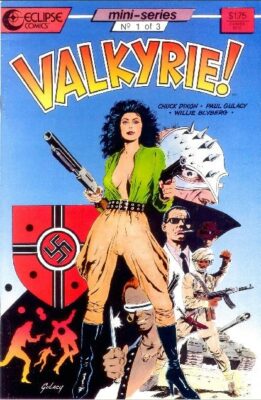
Chuck Dixon: Oh, yeah, yeah. I mean, I was so into it, I was so immersed in the world of Airboy that anything they threw at me I was like, yeah, yeah, I want to do that. And by this time, I had quit my job in security, I was full-time comics. So, I was taking on a tremendous amount of work. And I welcomed anything that they would… I basically wanted to own Airboy. I wanted to corner the market on Airboy. I didn’t want anybody else to write it. At the time, Eclipse didn’t want anybody else either. I was the go-to guy, which is where I always try to be when I work. I want to be the go-to guy. I want to be the guy who answers all your questions and solves all your problems.
Jim Thompson: So, the reason that I asked the question about the other characters is because I went back and looked at issue 50 and the comments that Kat wrote on the page, where she said, basically that you guys never liked Airboy, as a character that, that was the only problem with the series that you were uncomfortable with him being a boy fighting in the wars and different things. And the very concept was problematic and there just wasn’t enough to keep the title going, and that she sort of blamed it on the artist. She especially went after Ernie Colon for his slowness. And did that leave a bad taste in your mouth after a good relationship and a good number of years? When were you informed that it was going to be canceled?
Advertisement
Chuck Dixon: I kind of reached critical mass and my relationship with Kat, just a lot of stuff was happening. I mean, I agreed with her that Ernie Colon wasn’t really the right choice for that particular series. In fact, Dean and I ran into Dave Gibbons, as he was finishing Watchmen, and we talked him into doing that arc on Airboy. And for some reason that fell apart, but he was very interested in doing it. That fell apart and we ended up with Ernie as like a last-minute replacement. And then Kat was getting more and more steamed at Ernie for his lateness. And then she got really steamed at me because he bribed me with some artwork. He’s basically trying to make up for being late by sending me artwork, original art. In fact, he sent original art to other people at Eclipse trying to like apologize for being late. But I think he was working on damage control at Marvel at the same time. He was just overworked. And yeah, I love Ernie’s stuff, but he wasn’t right for that work. I don’t know why they chose him. There were other people that could have picked. And I didn’t pick him so there’s no reason to blame me. And I don’t know about Kat’s uncomfortableness. I mean, she made me jump through some hoops. There’s that story with the hot air balloons that she practically forced me to write. There was some guy who wrote some hippie-dippie Airboy story and she wanted me to help him with it. And I said why should I help train my replacement? Plus I thought the story was stupid. So, I didn’t. I refused having to deal with it.
Jim Thompson: Y’all we’re doing a lot of crossovers too. I mean, things like Airboy in radioactive hamsters.
Chuck Dixon: Yeah, yeah. Basically, they turned their Airboy into a crossover war, they were just sticking him and everything as the book was doing so well. And you know, continued to do well. They canceled it, I mean, I didn’t know they canceled it. I wrote a whole bunch of Skywolf backups, and one of them was drawn. It appears in the final volume of IDW’s reprints, the pencils for the Skywolf story that never appeared.
Jim Thompson: And you guys had a notion of doing a Cuba story, too. Didn’t you?
Chuck Dixon: Yeah, I mean, I wanted to show the story, where Skywolf often references that he’s the guy who kills Che Guevara and I wanted to tell that story. And the first step episode of it is in the final IDW volume and in pencil form. And yeah, that was the next thing. I wrote all five of those backup stories. And the only reason I didn’t write the Airboy lead was that Kat said she was still thinking about what she wanted from it. And it was discussions of Airboy showing up in South Africa when apartheid was still on and I was fine with that. And in fact I finally did Airboy issue 51 through It’s Alive Comics recently.
Jim Thompson: Just a couple more things, and then I’ll turn you over to Alex. The Airboy universe sort of wasn’t the only thing that you did at Eclipse. You also did, your creation with Strike!, was that yours? I know you wrote it.
Chuck Dixon: Yeah. Tom Lyle and I printed it together.
Jim Thompson: That would have been the first you worked with him?
Chuck Dixon: No, he was one of my Skywolf backup artists. I ran into him at a comic show in Baltimore. And I loved this stuff and invited him on to do Skywolf, and he did, I don’t know, maybe 10 Skywolf backups before we did Strike!.
Jim Thompson: You’ve had a long relationship with him?
Chuck Dixon: Yeah, yeah. All through Robin and the rest of it.
Jim Thompson: And Strike! was a very different but it was another young… you’re pretty much doing young heroes at this point. But he was an African American hero that gets a belt, power belt, right?
Chuck Dixon: Yeah, sort of a belt that allows him to turn into like a Captain American type character.
Jim Thompson: So, he’s a bit more of a superhero than a lot of your other works in that he does have superpowers?
Chuck Dixon: Yeah. Well, Eclipse was looking for superheroes because that’s the game, that was what was selling. I always said my only problem with creating a new superhero is they don’t have the advantage of having that Golden Age legacy.
Jim Thompson: But this one did.
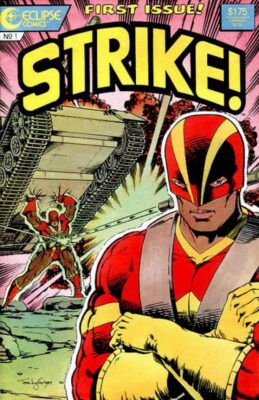
Chuck Dixon: Well, yeah. We invented a Golden Age legacy for this guy and I worked very hard on essays convincing people that there actually were Sergeant Strike comics in the 40s.
Jim Thompson: And it’s kind of like a Steel in Commander Steel at DC Comics. But it predates that, doesn’t it? Or does it?
Chuck Dixon: It may be contemporary with that, I’m not sure.
Jim Thompson: The Don Heck series of that time. And then outside of Eclipse and Comico and First, you also did a three issue adaptation of The Hobbit. This would be like 1988, 89, something like that, with David Wenzel. I have that. To this day I own those issues. I bought them at the time. And you really stuck to Tolkien. You use his language consistently on that as much as you could. Were you a big Tolkien fan?
Chuck Dixon: Yeah, read the books, and I liked them. And basically, Dean approached me, Dean found a public domain version of The Hobbit. He found an original manuscript that had never been published. And he sent me Xeroxes of it and said start working from this and I’m going to try to get the rights from the Tolkien Estate, which eventually he did. He said, “Look, we’re doing this with your without you. You can be on board and make it authorized or not get any money at all.” So, that was Dean. Dean is so awesome. He’s the greatest guerrilla marketer the comics has ever seen. He put me to work on it. I tried to do it as closely to Tolkien as possible. I tried to use only his language whenever I could. I didn’t invent dialogue or any of the rest. And it was hard because I had to trim so much. I had to leave out Beor who’s my favorite Tolkien character because there’s simply no room in the story for him. And so I had to-
Jim Thompson: it was so good too.
Chuck Dixon: Yeah. And I had to cruelly cut to make it work as a comic book. But then my editor, Sean Deming, went and he added more text, which I didn’t really think was necessary. He covered up a lot of artwork. I think there’s too much text in those adaptations. But I worked so hard to trim it down as much as possible, man still keep the feel.
Jim Thompson: Do people still come up to you at conventions and talk about that? Is that something that…
Chuck Dixon: Oh, yeah. It’s my biggest seller ever. I mean, I don’t have anything that comes close to how much that has sold worldwide. It’s pretty incredible.
Jim Thompson: Ah, that’s interesting.
Chuck Dixon: Yeah.
Jim Thompson: And that was published by Eclipse?
Chuck Dixon: Yeah, that was published by Eclipse initially. And then when Eclipse went out of business it continued on with I think Artcore maybe and ended up I believe with Del Rey eventually. I’m not sure. But the beauty of it was, is the contract I signed with Dean, thank you, thank you, Dean had a clause in it that no matter who took the property on they had to honor my initial contract with Eclipse.
Alex Grand: Oh, great. That’s awesome.
Chuck Dixon: Yes.
Jim Thompson: You still get money for that?
Chuck Dixon: Twice a year. Had to sick a lawyer on them but they finally ponied up, so twice a year. Yeah.
Jim Thompson: Oh, that’s great. ‘Cause out of that early stuff that you did, that’s probably the thing that don’t produces some money. I can’t imagine the rest of it does.
Chuck Dixon: Yeah, it’s never out of print anywhere in the world. I mean, a couple of years ago, the check was bigger than usual because it was the number one graphic novel in Korea over the Christmas season.
Alex Grand: That’s great. I love how random and awesome that is. Yeah.
Chuck Dixon: It is. Yeah. Believe me, I love it too.
Alex Grand: And you’re talking South Korea, right?
Chuck Dixon: Yes, yes. I don’t think North Korea pays royalties. It’s probably big there too, but I’ll never know.
Jim Thompson: And that was it for me, Alex.
Alex Grand: All right. Now tell us about encountering Larry Hama in your gateway into Marvel Comics, like what year was that?
Chuck Dixon: That would be 86 too. 86 was a big year for me. I’d gotten to know Hilary Barta, comic artist, and cartoonist by visiting Chicago a lot I ran into Hilary a lot. I was talking on the phone one time and he told me the Larry Hama at Marvel was starting up Savage Tales again. But instead of being a Conan comic, it was going to be an anthology with, like war and Western story. So, I’m like, “Oh my God, this is right in my wheelhouse. I love this stuff.” So, it was like a reincarnation of Two Fisted Tales from EC. So, I said, “Man, I gotta get on that.” And he goes, “Well, give him a call.” Right? But he says, “But when you give him a call, just be aware that Larry can be a bit of a bastard.” Which Larry, I don’t think Larry will deny. And I’m not telling tales out of school here. So, I call Larry and I’m sort of arm for a bear. You know, I’m just ready for a confrontation.
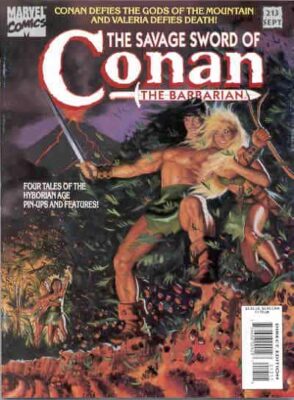
Alex Grand: Yeah. You’re ready to tackle, yeah.
Chuck Dixon: Yeah. You know, and I’m not usually that way. And so he tells me about it, and he doesn’t know who the hell I am and doesn’t care. And I said, “Well, I said, Larry, it sounds like you need me.” And he’s like, “I need you? Who the hell are you? Why would I need you?” And I said, “Well, mostly comic writers don’t know which end of a gun the bullets come out of.” And I said, “I’ll do the homework.” I said, “I love this stuff.” So, he says, “Yeah, you’re right.” He goes, “Well send me some of your stuff and I’ll see if I need you.”
Alex Grand: Yeah. And that probably spoke to him because he’s a gun owner, he knows ammunition, he served in the military. So, you’re probably talking his language there.
Chuck Dixon: Very much comfortable with a lot of stuff that, you know, and conversant with stuff that he was interested in. And he was always a creator that I liked. So, when you see as a creator, as a writer, and an artist and an editor do stuff you like, I mean, you assume there’s some sort of rapport. Because if you’re doing stuff, I like then we like the same things, right? Which was true. So, I sent him about 10 plotlines and he bought like half of them and then assigned John Severn to do the western ones which I could have died happy right then in there.
Alex Grand: Nice. Did you meet John Severn?
Chuck Dixon: No, I talked to him one time on the phone. He had a reference question. I never got to meet him unfortunately. I tried. There was a San Diego con that he was supposed to be at I don’t think he actually attended.
Alex Grand: I gotcha. And is there a reason why you like kind of that street-level kind of Western crime, war even barbarian stuff versus superhero, you know, things? Like, what is it about that, that you find appealing? Is it the gritty realism of it? Is that something you’re into?
Chuck Dixon: Yeah, I think that and I can’t really relate to saving the whole world or saving the whole universe, it’s not an ambition I ever aspire to.
Advertisement
Alex Grand: Yeah, yeah. So, you feel like survival, brutal survival, there’s something maybe as far as the way you’re looking at it, it just feels more honest in a way?
Chuck Dixon: Yeah, or a problem that’s right in front of you or an everyday difficulty. I mean, that’s what made Spider-Man work for me when I first started reading it. He had all these every day problems he had to succumb even though he was Spider-Man. You know, it’s like, but it didn’t matter because Peter Parker’s life was such a mess. And I mean, everybody can relate to that. Obviously, that was the key to Marvel’s success was that take. I always was more attracted to that kind of character.
Alex Grand: Yeah, that makes sense. Were you familiar with any of Larry Hama’s GI Joe stuff when you got together with him?
Chuck Dixon: Oh, yeah, yeah. I knew about GI Joe. And I knew previously working at Don, I know, and he was a guy I would follow. Like, if I saw his name on a book, I would buy it. Because I knew at some point, it’s honest, it’s grounded in reality at some point.
Alex Grand: I see.
Chuck Dixon: Even GI Joe as fantastical as it is, it’s grounded in that loyalty the Joe’s have for each other and that kinship, that brotherhood.
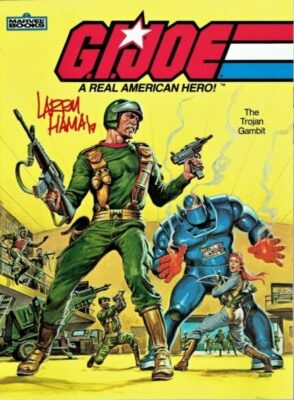
Alex Grand: Yeah. Yeah, that is great. I love that stuff as well. Then tell us how you got more deeper into Marvel through that relationship with Larry, and then your eventual meeting with Carl Potts on working with more Marvel street-level characters. Give us that segue.
Chuck Dixon: Once I proved I was reliable to Larry, that was a guy who handed in things when he said he was going to hand them in. And as Larry said, your characters are likable, your stories made sense and you handed them in on time. So, he went around to other editors recommending me. But that wasn’t the kind of guy most of the editors wanted. I never got into the mainstream Marvel clique with the superhero guys. And at that time, a lot of the books were written by editors. They were basically doing a round-robin. You know, I’ll edit your book, you edit mine kind of thing. So, it was harder to get in. So, I really didn’t get anywhere with Larry’s recommendation, unfortunately. But Larry was giving me lots of work, and I was getting a lot of work still working at Eclipse so I was busy.
Alex Grand: And then how did you end up meeting with Carl Potts?
Chuck Dixon: Well, that was through Archie Goodwin. Archie Goodwin was editing Alien Legion at the time and they were looking for a new writer. I don’t know what reason. They weren’t happy with the other writer but they’re looking for somebody new and Archie suggested me. And Archie is a guy who I had been talking with for years. I would see him at conventions and we would talk a lot and I actually went up and he interviewed me a couple times, looked over my you don’t miserable offerings. But he was always so generous and so gracious. And I think he genuinely liked talking to me. I got that sense and he liked my Airboy stuff a lot. So, he suggested me to Carl. And Carl was you know, reticent at first. I would be too. He had owned the property. Why hand it over to this newbie? But he was happy with the results and we became friends. I mean, I’m still astonished at how hands-off he was because he let me go wherever I wanted to go with it.
Alex Grand: And you found yourself putting a lot of your war script experience, your war story experience into Alien Legion?
Chuck Dixon: Yeah, yeah. I mean, it’s a military comic. It’s a war comic. So, you know, as crazy as the events are. And then I was able to visit every science fiction trope because I was a big science fiction reader.
Alex Grand: So, you’d already liked science fiction. Yeah.
Chuck Dixon: Oh, yeah. Yeah. So, I was able to think of like wacky situations to put them in.
Alex Grand: So, then as far as the Archie Goodwin, so it sounds like you’d already established a rapport, he was following your Airboy stuff and through that recommended you to Carl, and then it sounds like Carl enjoyed your stuff. So, then is that then, he was editing Moon Knight I think. So, then he kind of asked you if you wanted to write for Moon Knight also?
Chuck Dixon: Yeah, he asked me if I wanted to take on Moon Knight. And his idea was, is that we lean into the Mark Specter persona, the mercenary persona, kind of leave the schizophrenic character behind and just concentrate on he’s an ex-mercenary, which I was a big fan of the movie Dogs of War, which if you watched the movie and read the run, you can see a lot of that in it. So, I was like, yeah, and you know, just sort of went at it. Paul had give me Sal Veluto to work with, tremendous artist. And I got to work with Russ Heath for the first time. So, yeah, that was a great run. And you know, again, Carl was very hands-off
Alex Grand: Have you met Russ Heath?
Chuck Dixon: Yeah. A number of times. I spent a lot of time with Russ over the years.
Alex Grand: Tell us about Russ a little bit.
Chuck Dixon: The first time I had to call him, you’re a comic fan, you get in the business and there’s always guys you idolized you never dream you’re ever gonna get the work with. Well, I get to work with Russ. Russ has a couple of research questions that I’ve got to talk to him about. It took me three days to work up the nerve to call him. And Russ never did you any favors on that end. He was a bit of a ballbuster. So, every time I met Russ from then on for the next 20 years, he always acted like he didn’t know who I was, even though we worked together quite a bit. So, I don’t know if he actually didn’t remember me because he had no respect for comic writers or he just was fooling with me. But we spent a lot of time together. There was a point where he came to Tampa for a convention. We literally spent every waking moment of three days together because he wanted me to help him write his autobiography. And so we spent a lot of time talking about his life.
Alex Grand: Oh, wow. That’s great.
Chuck Dixon: Very little of it had to do anything with comics.
Alex Grand: How fun.
Chuck Dixon: Yeah, yeah. Yeah. Russ is a character and boy, what an artist. I mean just probably my favorite comic artist of all time.
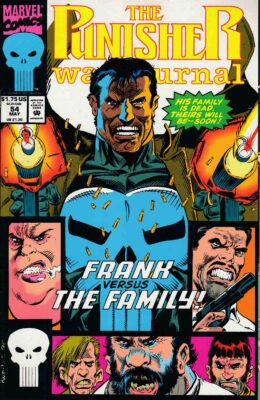
Alex Grand: Oh, that’s great. That’s great. So, then tell us about how you got into doing The Punisher because you were doing well with Moon Knight. And I noticed in a lot of your writing, like, what the character is thinking is in caption boxes, right, instead of a dialogue thought balloons. Is that by design where you specify that in the script? Or do they do that later? And what’s the draw of doing it in caption boxes versus a thought balloon?
Chuck Dixon: In the caption boxes, they’re narrating a story after it’s happened, as opposed to thinking about it as it’s happening. The thought balloons we’re kind of becoming passe anyway. So, I liked being able to have the inner thoughts of the characters. But what I like most of all, especially with The Punisher was using the narration captions as a juxtaposition for what was happening. So, Frank would say something pretty innocuous and then you would see in the panel how horrific the situation really was. And that was the source of the humor. ‘Cause Frank’s never trying to be funny, but he’s one of the funniest characters in the Marvel Universe if he’s written correctly.
Alex Grand: Yes, yeah. And that’s true. I mean, I like a lot of the Frank Castle, kind of one-liners. There’s an Xbox Punisher game, which everyone should play from 2001 or so, and the one-liners in there are perfect. It feels like you wrote that video game. Honestly.
Chuck Dixon: The first time I met Darwyn Cooke, he says “You wrote my favorite comic line of all time and it’s from The Punisher.” And I said, “Well, what was it?” He goes, “I’ll have to do the Joker hands-on.”
Alex Grand: I really enjoyed your Punisher war journal. Yeah, The Punisher graphic novel actually, Punisher: Kingdom gone with Jorge Zaffino, and just such an interesting art with your writing style. Was that a fun project to work on? Is graphic novel structure, do you think about that differently than a serial comic?
Chuck Dixon: Yeah, it’s kind of like a feature film. You know, that’s the approach you get into one big story and I had practice because I was on Savage sort of Conan and those are 50 paid stories every month. So, the graphic novel format wasn’t that hard to tease into. But working with Jorge on The Punisher was a dream because you know, we had done Winter World together, Zaffino was kind of white-hot there for a while. And I kept trying to educate – why this guy’s not a monthly Comic guy. This guy’s a special projects kind of guy.
Alex Grand: Yeah, that’s a good one.
Chuck Dixon: He’s not fast.
Alex Grand: Oh, I see just because and out of speed also. But his art style is not like your typical Marvel comic either.
Chuck Dixon: No, no. Your average X-Men fan, they weren’t into Jorge Zaffino. Jorge Zaffino was an artist-artist. He’s the only guy I work with, that artists always have questions about. What was he, how did he work, that kind of thing. They’re fascinated. Yeah.
Alex Grand: Yeah, fascinating guy for sure. And I think more as an adult like I appreciate what I see from him more than when I was like a teenager reading that stuff.
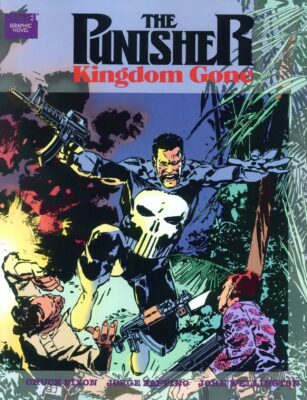
Chuck Dixon: Like when I was a kid, and you’d see Alex Toth and it was like, eh, and then as I got older, oh my God, this guy’s genius.
Alex Grand: Yeah. That’s right. I feel the same way about that. Okay. So, your Punisher, you were really hitting it out of the park with the criminal element. And then DC Comics editor, Danny O’Neil noticed your stuff. So, tell us about interacting with Danny O’Neil and then getting into DC Comics.
Chuck Dixon: Tom Lyle called me and said that Denny O’Neil, because Tom wasn’t working at DC at the time and said, “Denny O’Neil talked to me and he said he wants to know if you’d be interested in writing a Robin mini-series.” And he said, “He saw your Airboy work and he likes how you write young characters.” And I’m like, “Yeah, I’ll come up and meet with him.” So, Tom and I took the train up. We were both living in Lancaster, Pennsylvania at the time. So, we took the train up to New York, and I had a meeting. And I had met Denny before, sort of, because then he is a real shy guy. And sometimes that shyness comes off as rudeness. And the only time I’ve ever really interviewed with him, he didn’t even participate in the interview. I don’t even think he looked at me. He let his assistant at the time, Dan Rasport handle the interview. So, I’m going to talk about this Robin thing thinking where’s this going to go? You know, this guy wouldn’t give me the time of day before. So, I went up and I met with them and everything was great. But I said look, I’m gonna be honest with you, I’m not that into Robin, you know? And then he explained to me why they were bringing Robin back and he explained why Robin was important. I mean, normally the editor would go, “Well, you’re not into it, we’ll get somebody else.” But he was committed. You know, he really liked what I wrote. So, we did a lot of back and forth. And he convinced me that I actually loved Robin, which I did because I realized that all my favorite Batman stories growing up, were actually Robin centric. So, I was like the usual like the ignorant adult fan who thought Batman was better off being alone, which is not true at all.
Alex Grand: Yeah, that’s fascinating. And I’m kind of divided on that. I like both aspects. I’m not sure what I like more. To be clear to the fans, this was Tim Drake Robin as well. So, did that add anything more interesting for you to be able to pioneer new material for that character?
Chuck Dixon: Well, I mean, I had been following Alan Grant’s work. So, I was conversant with the Tim Drake character. And Alan was kind of building the character. So, I just sort of took off from there and then Danny’s purview was we want him as far away from Jason Todd as possible, because Jason Todd was such a failure. But we were never able to work out why Jason Todd failed, he kind of got away from us. So, we want this guy as different from Jason Todd as possible. So, I kept that in mind. And even more than Alan, I made Tim Drake sort of a reluctant Robin. The template in my mind was that this was a boy wonder, who would call 911 if he knew he couldn’t handle the situation, which he never did. But in his mind, I’m just going to watch these guys when things start going wrong, I’m going to call 911 instead of jumping and try and beat them all up. And then he was more tech-oriented and he had a secret identity, which made it a lot more interesting for me.
Alex Grand: Yeah. Interesting. And so then, did you feel pretty comfortable with Gotham City as you entered it like that?
Chuck Dixon: I sort of felt my way through the first three issue arc I did on Batman with Tom Lyle. After the Robin miniseries. I told Daniel O’Neil I don’t know if I have that many Batman stories in me.
Alex Grand: That’s fascinating. Yeah. Hundreds of them though, yeah.
Chuck Dixon: Yeah, yeah, literally. So, I did eventually get more comfortable with it. As I realized that everybody has their own vision of Gotham City, you just have to sort of run with it.
Alex Grand: That’s really interesting. It sounds like Airboy was really important because you then connected through both Marvel and DC through very important people, Archie Goodwin and Danny O’Neill. So, this is a fascinating way to kind of get into both companies and through those guys who obviously loved what you were doing with it. And then the Tim Drake series was really successful. There were a couple sequels, there was Joker’s Wild, Cry of the Huntress in 1992. And at this point, was it a different environment creatively working at this point with Danny and the Gotham City Stories as compared to like Marvel with Potts and doing Punisher? And did they have more input in what you were doing? Did you have less freedom? Tell us about that?
Chuck Dixon: Well, there’s two kinds of editors. There’s the kind of editor who hires you because they like what you do and they trust you and they let you run off and do it. And then there’s the editor who wants to be over your shoulder all the time. And then there’s Don Daley, who was my Punisher editor. He’s the third pen editor, but Danny was the hands-off. He was the, “I hired you, I liked your stuff, I think you’re competent. We’re gonna see what you do.” And there were only a couple of times that he didn’t like what I did. At one time, he was mistaken because it was a change the artists made, but there were only two times I heard from him that he didn’t like what I did. And that’s 11 years working with him. And then Don Daley was the challenging editor. You know, I want a three-page story, I want a two-page story. I want you to describe the opening of a story to me right now on the phone. And all that was fun, I love that, Don was great. He was a different kinda guy.
Alex Grand: So, you just kind of look at each one has its own challenge and is its own interesting task.
Chuck Dixon: Yeah, I mean, Danny gave me a tremendous opportunity, obviously, and just let me fly on so many projects.
Alex Grand: Yeah, that’s a legendary run. I mean, the 90s and Batman, that’s Chuck Dixon. Really? And I think a lot of people know that.
Advertisement
Chuck Dixon: I kinda own the 90s Batman.
Alex Grand: You own 90s Batman, yeah. And that’s interesting because the 90s was huge for Batman, obviously. There were all those graphic novels and all that, the movies that you were there, in the middle of all that. You were the think tank for a lot of content that has been manufactured into various media and that’s really fascinating to me. So, did you bring any elements of Punisher into Batman, and is it weird writing for one character that kills criminals with a gun? And then another one that devoutly won’t do that?
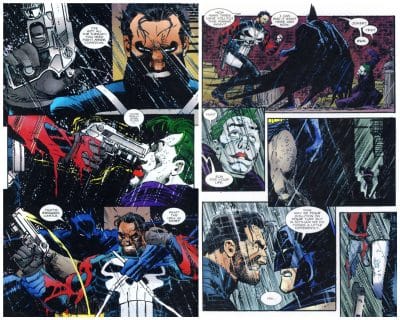
Chuck Dixon: Yeah, you just sort of have to get your head around that. I mean, I have more of an affinity for Frank Castle than I do Batman. You just sort of have to put the Batman hat on and like, what’s his point of view? What’s he want? What’s he looking for? His background. When I wrote Batman Punisher meeting, I kinda had Joker describe the difference between the two characters. You know, as he psychoanalyzes them. And Batman’s traumas from when he was a child so he reacts as a child would, Punisher’s traumas for when he was an adult, so he reacts as an adult would. But no, I mean, I wrote some really impassioned anti-guns screens for Batman, you know? And I’m an NRA member.
Alex Grand: Yeah, yeah, right.
Chuck Dixon: Stay true to the character. That’s all… That’s my argument with a lot of comic books today is that they kind of morph the character into the writer’s own point of view. And I’m like, that’s wrong.
Alex Grand: I see. And you were, you were honest to the character and that’s for sure. And that’s a great observation about Batman and Punisher and when their trauma happened, and then how they react to that trauma, that’s really great. Because Batman is like a little boy, he keeps thinking he’s eight, or whenever he was. And Frank is always thinking about losing his wife and kid. That’s really different from than losing your parents. That’s really fascinating.
Chuck Dixon: Bruce is like, I’m gonna dress up in a costume and scare people. Well, that’s what a kid would do.
Alex Grand: That’s what a kid would do.
Chuck Dixon: Frank is I’m gonna go out and kill ‘em.
Alex Grand: Yeah, I’m the Grim Reaper. You guys are going to die. Yeah. Yeah, yeah, that’s for sure. And as a Vietnam vet too, right, that there’s a different vibe there. Tell us about creating Birds of Prey with Jordan Garfinkel in 1996 because that’s a big deal. And that’s been obviously put into various media. Women getting together kicking ass, it’s a fun series. Tell us about that.
Chuck Dixon: Jordan had this crazy idea that Black Canary and Oracle would make a good team for a comic. I’m like “Nah, ‘cause Black Canary just got her recent solo series canceled. So, the readers don’t like her, and I don’t think Oracle could carry a book. She never leaves this room, you know.” And he kept insisting that there was a chemistry there. Finally, he got the green light for a special and he said, “Please, I want you to write it.” And I said, “Okay, I’ll give it a shot.” So, six pages in I realized, “Wow, Jordan was right. There’s a real chemistry.” The characters are so different that it makes the relationship interesting. It was his idea the gimmick and the onset of the series was that they never meet. And that Black Canary literally has no idea who she’s working for. I think it’s Birds of Prey 18 or something until they meet. And editorial meetings kept pushing for more and more of this material. So, we did one-shots. I remember that we did a mini-series when another mini-series got canceled and there was an opening at the printers So, they had an opening in the printer schedule for four issue mini. And Jordan calls me and says “Can you hurry up and write a mini-series of Birds of Prey?” He’s like, “I just promised the editorial board we could do it.” So, eventually, we convinced DC to go monthly on it.
Alex Grand: Do you like the various media that Birds of Prey has entered into as far as movies, cartoons, all that? What’s your feeling of that?
Chuck Dixon: I think they missed the boat. They don’t understand what it was. They think it’s just a bunch of girls getting together and fighting crime or you know, they missed that there was a through-line to it. There was a theme: the Birds of Prey and none of them got it. And I remember I met Dina Meyer, who played Oracle, played Barbara Gordon on the TV show. And she said that she worked out with a wheelchair for months preparing for the role, and even went to a martial artist and learned how to fight with a quarterstaff from a wheelchair. And when she got to the set, they had a powered wheelchair. So, all of her training was for nothing. And she said, “Didn’t they read the comic?” And I said, “No. I don’t think they did.”
Alex Grand: That’s funny. Yeah. A little review so that the audience knows as far as your 1990s Batman. So, you wrote roughly 70 issues for Nightwing, around 100 issues of Detective Comics from 1992 to 1999. Major storylines, Knightfall, No Man’s Land, you co-created Bane, a lot of issues with Graham Nolan. Tell us first like do you feel like you were having the time of your life at that point? Did you feel like this was great or were you like, okay, this is a job and I just want to do a good job?
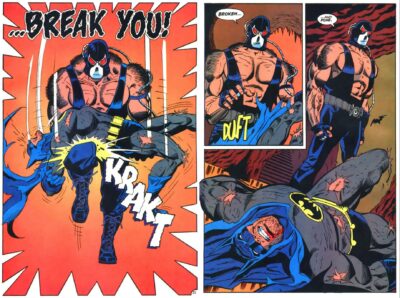
Chuck Dixon: I never thought I’d ever write Batman. It’s something I never aspired to. I thought there’s no chance, it’s too much competition. Everybody wants to write Batman. So, I ended up in Batman. I swear to you, every time I wrote the words, Batman and Robin, I got a thrill. Like, I’m the luckiest guy in the world. I’m writing Batman, and I’m getting to work with some of the most awesome talent in comics to do it. And I’m getting to work with my buddy, Grant who’s like Batman 101. This guy’s like, he should have a Ph.D. in Batman. He’s such a fan and he was so knowledgeable. So, it was hog heaven for all 11 years.
Alex Grand: And you guys still are good friends and still do some things together, right?
Chuck Dixon: Oh, yeah, yeah, we did a series, Joe Frankenstein, we have an upcoming Expendables: go to hell graphic novel we did together. So, yeah.
Alex Grand: And you’re pretty tall, aren’t you?
Chuck Dixon: 6’3
Alex Grand: Yeah, 6’3 because the thing is when I see Graham Nolan’s picture, and he’s got these biceps, that guy’s Bane, but I saw you guys standing next to each other in the picture, and I’m like, wait a minute, this guy maybe Bane here. But now tell us about co-creating Bane?
Chuck Dixon: Well, when we started Knightfall, we had a like to-be-determined villain. Then he said, we got to have a new villain. We got to come out of this with a new villain. And it was understood that this new villain would be addicted to venom, was just the sort of steroid growth hormone narcotic, whatever the hell venom is–
Alex Grand: And I saw a lot of those guys at the gym in the 90s by the way.
Chuck Dixon: Yeah, there you go. There you go. And it’s a roid rage character, but he was also had to be the intellectual and physical equal of Batman. In other words, a worthy opponent. Because in Denny’s mind, Superman had just been killed by a giant space bug, no one remembered. He says, “We got to come out of this with a character people remember.” Well, that’s a tall order. So, at our second summit, we filled in the name Doc Toxic like a working name. And we really didn’t have anything about and because we were working our way up to Knightfall. Then we got to the point where we needed to have this guy, we needed to know who he was, what he was about, what he looked like. And we had like a sort of a mini-summit in which Denny opened up as he usually did, here’s what we need to do. And then I had the argument to make this whole Knightfall thing work, to make two years of Batman continuity work. This guy’s got to be popular. The readers have to like this guy or love to hate him. They’ve got to hook into him. You know, he’s got to be carnage, he’s got to click, and that’s hard to do. So, that’s really hard to do because you got to guess what the readers want. And it’s gonna take–
Alex Grand: And I love the South American angle you took on it.
Chuck Dixon: Yeah. So, Denny said, “Well, if you think it’s gonna be so damn hard, then you do it.” And he basically sent me home to create this character. I knew Graham was gonna do the initial appearance. So, I talked to Graham and I came up with sort of a man in the iron mask kind of thing. And then I read somewhere, I think Wall Street Journal that in North Korea, you could be sentenced to serve the prison sentence of a relative. And they said they’re actually wives and children in prison serving terms for people that they couldn’t catch. And I thought, wow, what if someone was a child in prison? Then I thought, what if you were born in prison, if you were born into a life sentence; what kind of a monster would you be by the time you reached adulthood? That’s when it started to take off. And then in talking to Graham, I said, well, let’s give him the South American, Central American background. And Graham says, “Well, what about luchadora look?” And I’m like, “Sounds good to me.” And he was already faxing drawings over to me that day.
Alex Grand: Yeah, that’s right. The Mexican wrestler thing. That’s awesome.
Chuck Dixon: And then a Bane I got out of the thesaurus, I looked up evil. What’s another word for evil? Bane. And when I called the DC editors, Denny and Scott Peterson and I said, I want to call the guy Bane. “Oh, we hate that. Nobody’s gonna remember that name. It’s too short.” Because remember, this is like the image period, every character was star slasher.
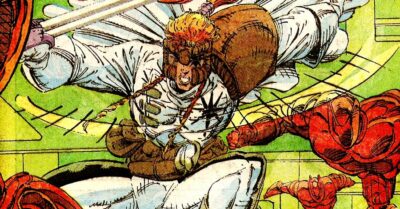
Alex Grand: That’s right. That’s true.
Chuck Dixon: I said, “We’ll just live with it for a few days.” ANd I never heard it again. He was Bane from that point on.
Alex Grand: Yeah, for sure. And that name sticks. So, Bane, did you like the way they– the treatment he got from the Batman animated cartoon?
Chuck Dixon: Oh, I loved it. I love it. And the idea of Henry Silva, one of my favorite villain actors doing the voice, I was over the moon. I was really happy.
Alex Grand: That’s awesome. So, you were happy with how that turned out?
Chuck Dixon: Oh yeah. Oh yeah.
Alex Grand: And then No Man’s Land, that’s gotten a couple adaptations because I think the third Christopher Nolan movie which had Bane obviously threw it in and they kind of combined Bane and No Man’s Land in that. What do you think of that movie?
Chuck Dixon: You know, I like it that they made him a household name. I liked that he was portrayed as an intellect, chess player, always one step ahead. But you know, the movie’s a mess.
Alex Grand: Yeah. Did you think his voice was kind of weird in that?
Chuck Dixon: Yeah, I don’t know what they were going for and I don’t know why they would– his superpower is he’s on painkillers? I mean, I didn’t understand that. I really wanted to see I mean, especially now with CGI effects and all, I wanted to see the venom effect. That would have been frightening.
Alex Grand: That would have been interesting. Yeah. He was in that, with the Arnold Joel Schumacher film. That was a little weird I thought. What was your take on that?
Chuck Dixon: He looked great. I mean, the scene where he deadlifts the bat signal off of this thing, that’s awesome. But they just had him as a henchman. I remember they told us that he would have no dialogue, and I remember going up to DC one time I’m walking down the hall and somebody came out all excited. And said, “They’ve added dialogue for Bane.” They looped in some dialogue for him. Like, “Oh okay, great.”
Alex Grand: Now what do you think of the show Gotham because they had a No Man’s Land arc at the end. Did you like that?
Chuck Dixon: I couldn’t watch that show. I mean, a Batman show without Batman made no sense to me. I have no desire to see it. And then boy that Bane is the worst Bane ever. I mean, he would get kicked out of a con if came in cosplaying as Bane. I mean, that’s… I mean, what were they thinking? He looked like he was from a 1970’s Saturday morning cartoon.
Alex Grand: Yeah, that’s true. And I’ll say it was tough for me the first two years of Gotham I kind of powered through but then by the third season, I got it. It’s a what-if universe. It’s what if instead of Batman’s presence creating the villains, what if it was the other way around? That’s all they basically did. Once I got my head around that I was like, all right, I’ll finish it. Yeah, I didn’t mind it. I actually kind of like the end.
Chuck Dixon: Yeah, just there’s a further dilution of the DC Universe. They do too many different versions of things. Whereas Marvel is like one version of Iron Man, one version… DC, there’s like 16 different versions of every character.
Alex Grand: Yeah, yeah, it’s not unified. I think Archie is like that, too. I mean, every rendition of Archie, it’s like zombie Archie and all that stuff. All right, so now a couple more questions. You basically we’re working on seven titles, at some point between 93 and 98, like seven titles a month. It doesn’t get confusing? Did you ever mix scripts by accident? I mean, that sounds hard.
Chuck Dixon: Well, probably my life outside of writing is more confusing than inside writing. No, it was never hard. It was never hard. And because I worked so far ahead of schedule, I was able to immerse myself in one title, because I read that when John Byrne was doing that Fantastic 4, I forget the other title he was doing simultaneously, writing and drawing, he would work six months on one and six months on the other to create a year’s worth of work. I thought, well, that’s not a bad idea. So, I’ve worked to get far ahead of schedule on everything, so that I could literally spend the month on Detective, spend the month on Nightwing. And then in between, Don Daley would be calling saying, “Hey, what about this? What about that?” And I would jump on a Don Daley thing for a little while. But because I was so far ahead of schedule on everything, I mean, so far that they stopped sending me deadline notices from DC because they were irrelevant by the time they got to me. Because I was so far ahead, I was able to accept other assignments. I’m not cheating anybody here, I’m literally almost a year ahead on this title.
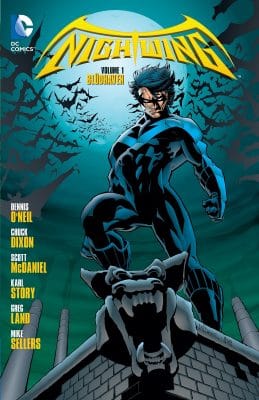
Alex Grand: Yeah, you’re done.
Chuck Dixon: …this graphic novel, this miniseries and fit all in.
Alex Grand: Yeah, yeah. ‘Cause you also did stuff for Catwoman, Green Arrow, so a lot of things. So, you’re very prolific. Then you also did a Batman- Spawn story, as well. And that’s… you know, the crossovers between companies, you know, the 90s was big on that, obviously. Tell us about Batman- Spawn. Did you like the Spawn character? I don’t see how they mix well, personally.
Chuck Dixon: I didn’t get Spawn. I knew that either the other two writers Doug or Alan, I mean, what happened was we were in a bat summit, a bat summit and then he said, there’s this… We’re doing two Batman- Spawn things. One’s gonna be published by Image, one’s gonna be published by DC and he says, “I don’t want to give the one at DC to one writer.” He says it’s not fair because it’s gonna be a big royalty pair. And so he split it. He said you, the regular Batman writers will write it together. So, it was Doug Alan and me. And we determined who would write what by writing our names on a piece of paper. And Jordan Garfinkel pulled them out of Denny O’Neil’s hat, because Denny always had this ass kicking fedora that he wore. And Doug got the beginning, I got the middle and Alan got the end. And then we realized that none of us had read Spawn or if we had we didn’t understand it. And so Doug volunteered to get on the phone with Todd McFarlane, he spent most of an evening on the phone with Todd McFarlane while we were at the summit, and Todd explains Spawn to him. And Doug came in the next morning with like, this legal pad with all these notes on it. And he explained the character to us, so we could proceed. And if I remember correctly, he and Alan went off and plotted. I didn’t have any part in the plotting. Okay. And my only asks where I want to have Batman make fun of Spawn’s cape, and I want Spawn when they’re introduced to say you can call me Al. And Todd said, fine to both.
Alex Grand: There you go. So, then, tell us about the Tangent Comics Imprint. You did a secret six in 1997, that was kind of a Dan Jurgens’ side universe. Tell us about that.
Advertisement
Chuck Dixon: I don’t know quite what they were doing but they just basically laid this thing on me like you know, here, what about this? And it’s Dan. So, it was perfectly laid out and perfect– fully realized. I mean, there wasn’t really a whole lot more to think about. And it was just basically a new playground to play in. And so I was like yeah, you know, I like all the guys, you know, everybody working on it and I wanted to be part of it.
Alex Grand: Yeah. Did you like that kind of other universe scenario, kind of what-if scenario, did you have more freedom or was it pretty much you’re locked into, kind of what Dan Jurgens, you know, parameters he set out?
Chuck Dixon: No, no. He kind of left it open-ended. I mean, obviously, it’s freeing because you know, we always work with the illusion of change. I mean, you can’t change everything because these characters have been around forever, and they’re gonna be around for generations after us. So, you can’t make startling, you know, continuity changes but here you could, you could kill characters, have them married, having different relationships, turn heroes into villains, villains into heroes. I mean it was wide open. But yeah, it was fully realized, but it didn’t tell you what to do. Dan has too much respect for people to micromanage them.
Alex Grand: That’s awesome. Yeah. Now, one more question before Jim talks about when you leave DC, is that when you mentioned the illusion of change, and writing so many issues for something, you always have to have that in your mind that it’s got to return to status quo in some way. Does that affect your enjoyment of the assignment in any sense?
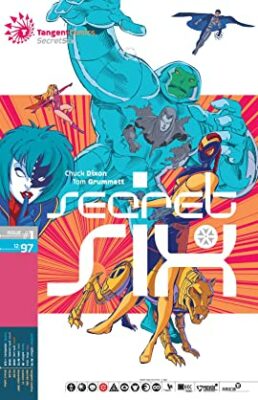
Chuck Dixon: No, because I like the challenge of staying within the framework. I like that. I mean, I did a date rape story and Robin, in which Ariana, his then girlfriend is almost date rape but gets away. And then he says, “Well, I think the story would be more impactful if she actually were raped.” And I said, “Well, first of all, I don’t want to portray rape in a comic in any way, no matter how subtle it’s shown.” And I said, “And secondly, I don’t want that to be part of that character’s continuity ongoing.” We don’t know what’s going to happen. Ariana may turn out to be Tim Drake’s Lois Lane, and I don’t want that in her backstory, and he agreed with me. He said that, that made sense. So, you know, it’s things like that, that you have to be aware of. You wanted to leave everything the way you found.
Alex Grand: Yeah, that’s good. That’s interesting. And that comes down to the betrayal of the character and all that, and that you have a sacred duty. You’re carrying this torch too, to some degree, right?
Chuck Dixon: Yeah, absolutely. We’re shepherds. You know, I mean, we’re not auteurs. So, at least that’s the way I see it. So, if I make it, this is all about me, and I’m gonna make my mark on this character, well, you’re going about it the wrong way. You know, I like the Invisible Hand style of writing where I don’t want you to be aware there’s someone thinking about this. I don’t want you aware of someone creating a story for you.
Alex Grand: Right. Hey, Jim didn’t Alan Moore trademark or copyright rape in comics at some point, like no one’s allowed to do it, except for Alan Moore?
Jim Thompson: No, no. I almost wish that was true because then we wouldn’t have identity crisis, which I think is the most objectionable one I can imagine. I don’t know how you feel about that, but I thought that the rape of Sue Dibny, the murder of Robin’s dad, everything about that rubbed me the wrong way. I thought it was one of the worst moves DC’s ever made.
Alex Grand: What do you think, Chuck? What’s your take on that?
Chuck Dixon: Yeah, that just gets ugly. I mean, everybody has to remind themselves the comic superheroes are basically, I’m sorry, they’re created for children, you know. And when you go that far with things, it’s kind of fetishistic, it gets weird. I don’t mind, as an adult, I’ll read a superhero thing. I mean, I love old Captain Marvel comics and stuff like that. I’ll read them and I’ll enjoy them. But always remembering these are children’s wish-fulfillment fantasies, and you shouldn’t mess with them.
Jim Thompson: That’s right. When Darwyn Cooke did DC he did New Frontier. If he wanted to do the Parker adaptations, which are brilliant, I love those. But that’s fine too, but don’t bring them in and combine them into the same universe. That’s my thought on that.
Chuck Dixon: Yeah, that’s– I hate when people talk about gritty comics. It’s like, okay, fine, but not with superheroes. When superheroes are on beach towels and lunchboxes and pajamas and you got action figures, I used to use that argument all the time, when editors or writers wanted to make massive changes in the characters that I felt were wrong. You know, I got in a big argument with a writer once about there should be a vertigo version of Superman and Batman. I said no, there should never be an adult version of Superman and Batman.
Alex Grand: Yeah, so comics industry, if you’re listening, keep the ball gag out of Superman’s mouth. That’s all I’m trying to say. That’s all we’re all saying here.
Chuck Dixon: And don’t have Batman wet his pants. Not good, not good.
Alex Grand: All right, Jim, go ahead.
Jim Thompson: So, Alex, I was gonna do CrossGen next, but I want to ask a few Batman questions. as well. We talked about Bane and I will acknowledge he’s probably the big guy that you did, but I feel like we’d get in trouble if we didn’t bring up another name, which is Stephanie Brown Spoiler is also a key character that you did, and so your thoughts on her and basically her status.
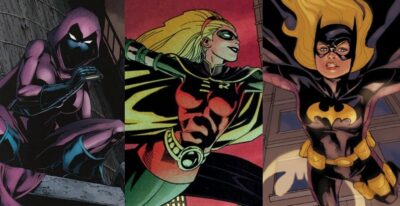
Chuck Dixon: Well, she began as a plot device I mean, she was going to be in one story only. You know the idea being that how would a super villain’s child rebel, teenage rebellion, and teenage rebellion was being a vigilante and basically ruining all of her dad’s crimes. And we kind of forgot about her until the letters came in. And a lot of letters came in. And it wasn’t if she’s going to come back, it was when. They just thought she was a permanent part of the Gotham City cast. So, you know, we started using her more often and then I really grew to really like the character. I probably have more affinity for Stephanie Brown than any other character in DC. She seems alive in my head.
Jim Thompson: She’s probably my favorite character that you wrote. I like her a lot.
Chuck Dixon: I don’t know if I worked hard to make her three dimensional. She just sort of wrote herself.
Alex Grand: That’s interesting. Maybe you’ll send me your past life. What do you think?
Chuck Dixon: Yeah, and it’s possible.
Jim Thompson: Yeah. My other question is when you leave a title or leave a character, do you follow what other people do with it? Like when you were talking about The Punisher, and I don’t always like everything that Garth Ennis does, but I felt like he understood that character. And I wonder, do you read Dennis’s run on Punisher?
Chuck Dixon: That, it’s a rare instance of yeah, I read some of Ennis’s run, because I’ve heard so much about it. And I did like it. He did get the character, and he did something that I should have done and never did. He gave the series a recurring cop character. I really wish I had done. That was something missing from my run.
Jim Thompson: That one stands out in my mind. Did you read anyone else’s works on Birds of Prey?
Chuck Dixon: No, not really.
Jim Thompson: ‘Cause it goes in a very different direction.
Chuck Dixon: I dont read it when the kids go off with the new dad.
Jim Thompson: Only other one, I would say would be the Andrew Baker’s and Darwyn’s Catwoman is the real treat also.
Chuck Dixon: That was great stuff. Yeah, I read everything Darwyn wrote.
Jim Thompson: Yeah, one of my favorites. The other thing I wanted to ask about was, you did some Elseworlds. Again, this comes back to one of my earliest questions with you which were spaghetti westerns. You did those Justice League westerns. I love those and you did that Robin Annual with just fantastic Beretta artwork, great stuff. That last page on that Robin Annual is magnificent. But you also did Conjurers and that seems so not what I would have expected from you in terms of it’s so not grounded and so fantasy-oriented. Were these just assignments that you would be given or did you come and say I want to do another western– superhero as western book for Elseworlds?
Chuck Dixon: The Justice League Western, that was Eddie Braganza came to me with that. And I don’t know if it began with Eddie or not. It might’ve began with the previous editor and then I ended up doing it. So, that came from them. Conjurers came from me because I mean, the door was open. I mean, editors were asking me to do stuff for them. So, I came up with the Conjurers and yeah, I don’t really write about magic that much. But I like the idea of a DCU where magic worked and science was unknown. The science was something that was looked down upon, what would that world be like? Well, it would be kind of technologically stunted. I got to use all these– every single DCU magic character. And the thing that made it for me was getting to use Stanley and His Monster, and also the heavy Lovecraft tones of it.
Jim Thompson: Stanley and His Monster, Kevin Smith uses that too in his Green Arrow. Because I love that comic going back and it never got any other use, I think except for those two.
Chuck Dixon: Yeah everybody forgot about him.
Jim Thompson: And then I just want to mention before going to CrossGen, I would also add I thought your Batgirl year one was really good. That got people’s attention, they enjoyed that I think a lot.
Chuck Dixon: Yeah. Yeah. I mean, it’s almost like lightning in the bottle because we had done Robin year one, and that was successful and then Bat Girl year one and Scott Beatty and I enjoyed working together and our talents sort of mesh perfectly for that kind of story. And then the artwork, Marcos Martinez is absolutely amazing.
Jim Thompson: I can picture those panels. It was fantastic looking, just a nice looking book.
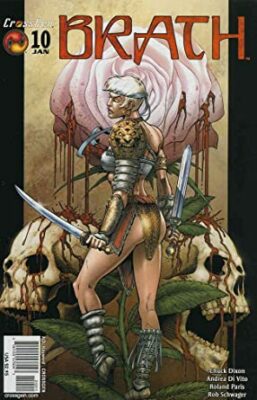
Chuck Dixon: Yeah, yeah.
Jim Thompson: Let’s go to CrossGen for a little bit. This was what, around 2002, this how did that come up?
Alex Grand: And if you can let us know why you left DC as you answer that question.
Jim Thompson: Well, I don’t think he does necessarily, Alex. I mean, you’re still carrying over a little bit at DC while you’re moving over to CrossGen, right?
Chuck Dixon: I basically gave them six months notice and I kept working. So, even while I was at CrossGen, I was still working. I signed with CrossGen in September. No, actually end of August 2001. I didn’t actually officially start work until March 2002.
Jim Thompson: I see. Let’s go ahead. What was the impetus for you looking toward CrossGen as an exit strategy for DC?
Chuck Dixon: Well, I really wasn’t looking to leave DC. But Denny O’Neil retired, his merry band of assistant editors all went on to other jobs. And so I was with a new editor, who was the kindest thing I can say is indifferent, just different to me personally and my work. But I had the sense that he would love it if I would quit. But he couldn’t justify firing me because my titles are all doing very well. I had three titles that were all selling very close together. And I’ve been told Nightwing was basically the bellwether book at DC. It was the book they looked at To see how the whole line was doing. So, he couldn’t get rid of me. Although I was told by other editors that he did everything he could to try to make that happen. So, what he did was he just basically stunted me creatively. I would present ideas and they would just get shot down or not considered at all, which was something I was not used to under Denny O’Neill and Mike Carlin and you know, other editors Chris Duffy, other editors at DC. I was always– my ideas were always welcome. Maybe not always greenlit, but always welcome. And I got the idea this guy just didn’t want to help me out at all creatively. And was trying really hard to lock me into an exclusive contract, which would have further stunted me creatively, because DC can literally limit the amount of work I can do by having an exclusive contract. That’s when I was approached by CrossGen. Now I’m gonna make the change.
Jim Thompson: Who approached you?
Chuck Dixon: Ron Morris was the initial who approached me at a Con. He brought along Butch Guice, and they basically took me out to lunch at a Con and talk to me into at least coming down to Florida and seeing what Mark Alessi had to say.
Jim Thompson: Had you worked with Butch before?
Chuck Dixon: Yeah, Birds of Prey.
Jim Thompson: Yeah, that’s what I thought. So, you went over there, now at this point, Mark Waid was still writing the stuff at CrossGen, a lot of it?
Chuck Dixon: He had quit. I mean, it was understood that I was gonna be Wade’s replacement. I was gonna replace Waid.
Advertisement
Jim Thompson: And so did you have to go back and reread all of the books so far for CrossGen? Because it was a very tight storyline and universe in some ways.
Chuck Dixon: Yeah, I always handled– they gave me all the issues. They gave me this huge binder, laying out the universe and a couple of other binders, none of which I ever even looked at. My first thing was they want me to take over Crux, a Waid title. I took it over. I enjoyed it mostly because I got to work with Steve Epting. But it’s frankly a book I never quite understood and Mark Waid wasn’t terribly helpful. He basically admitted he created it on the way from his apartment to the offices one day. But my main task when I got there was to create a martial arts title set in Asia.
Jim Thompson: And that was Way of the Rat?
Chuck Dixon: That became Way of the Rat. That was my first run-in with Mark Alessi. Because he fought me on a lot of the ideas that made Way of the Rat work. You know, first of all, I’m in office, I’m right there with my artists. That was all very, very cool. So, we would have these meetings, endless meetings, and boy, hell is going to be an eternal meeting. It’s going to be a meeting, there were in. And so many of the meanings would be meaningless, like, just let me get to work. I know what I have to do. In fact, I could be telling all of you what to do, because these were not comic book people running these meetings. We had no editors, but we still had overseers, I would say.
Jim Thompson: You built your own little world within their CrossGen world because the planet Hann Jinn, is that how you say it, Hann Jinn?
Chuck Dixon: Your guess is as good as mine.
Jim Thompson: That was featured in three different books you were doing; Brath, and I’m not sure what the other one was. But they all had very different things going on. The only one that was a martial arts book was the Way of the Rat. Is that right?
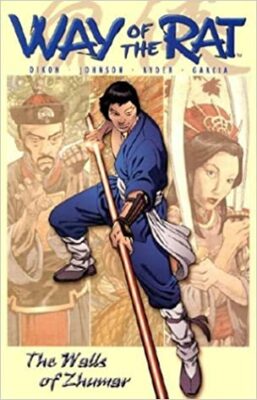
Chuck Dixon: Yeah. You know, Brath was kind of Conan set in a sort of Roman Empire world.
Jim Thompson: Right. And the other one was Asian focused too, wasn’t it?
Chuck Dixon: The Path. The Path was Samurai book, the Ron Marz book yeah.
Jim Thompson: That’s right. You had not done a purely martial arts book before, you hadn’t done Richard Dragon yet.
Chuck Dixon: No.
Jim Thompson: But you’re Robin series had a lot of martial arts.
Chuck Dixon: Green Arrow as well.
Jim Thompson: Oh, yes, that’s right and Green Arrow as well. You also did a spin-off of Ruse was my favorite of the Mark Waid books that he did in that– In fact, that was the only one I was able to read really was the–
Chuck Dixon: It’s a beautiful book.
Jim Thompson: That’s a beautiful book, The arch, great, the story was super well structured. And you did a spin-off on that. What was that about?
Chuck Dixon: Archer’s agent was just basically to play around in that Victorian England kind of world. And I think the impetus behind that was mostly Mike Perkins. And I wanted to work together. And this was a way to do that. That’s how it started out. And then I kept coming up with storylines. I had another one for Mark. It was a murder mystery set in the Raj in India, that get solved by a scaphoid soldier, and we never got to it. And Mike and I were really in love with that story, but we never got around to doing it.
Jim Thompson: Are you ever going to get to do it?
Chuck Dixon: Oh, I don’t think so. I don’t think so.
Jim Thompson: And I don’t know why there aren’t tons of these but I love pirate books, and you got to actually do a pirate book. Talk about that a little bit.
Chuck Dixon: Well, when I first met Steve Epting, we sat down because I was supposed to meet with all my artists for the first time and introduce myself and I love Steve’s work prior to this anyway. And we met and I said, I have a 12 issue plan for Crux. And he says, “Well, what is it?” I said, “You’re going to draw 12 more issues of this, and then we’re going to do a pirate book.” So, I kept talking about a pirate book, and it wasn’t getting anywhere with anybody. Nobody would listen to me about the pirate book. And finally, I realized if this is ever going to happen, I just have to make it happen. So, I told Steve, this is your last issue of Crux. Here’s the script for El Cazador, it’s our pirate book. And that when you’re done with this issue of Crux, start on El Cazador, and I didn’t get permission, and I didn’t tell anybody we were doing it. And Mark Alessi as he would do was touring through the studios, he looks at what Steve Epting’s doing. And he goes, “What issue of Crux is this for?” And Steve says, “It’s not for an issue of Crux. It’s a new book Chuck and I are working on.” It’s the first time I heard of it.
And so Mark appears in my doorway; “What the hell are you doing? What is this El Cazador?” He couldn’t pronounce the name. I forgot what he called it. And I said “It’s a pirate book. We need a pirate book.” Pirates… I said, “I feel in my bones that pirates are about to happen.” The Pirates of the Caribbean was months and months and months away. I said, “Pirates are the next big thing.” And he says, “Well, I didn’t create this company so you could do what you want to do.” And I said, “Well, yeah. If we were doing what I want to do, Steve would be drawing a cowboy story.” Pirates, we need to do a pirate book. We’re the perfect… And we were. We were the absolutely perfect company to do a pirate book. And eventually he had to admit I was right because it was our biggest seller.
Jim Thompson: It was great. That was the other one I really liked besides Ruse, those with my two favorite CrossGen books.
Chuck Dixon: And we killed ourselves on it. I mean, we had books, Steve and I had books of Knots I mean, because we wanted everything right. And I convinced Mark to get us a computer program so we could make wireframe models of all the ships so that Steve wouldn’t have to, so we could meet a monthly deadline basically, and still have all the pirate ships and everything in it, period, accurate and perfectly presented.
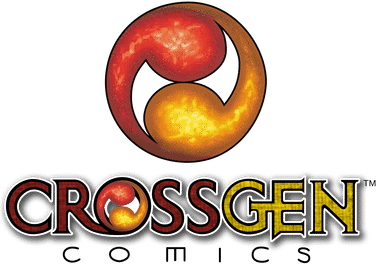
Jim Thompson: So, by 2004, what happens? Are you ready to leave? I know CrossGen is crashing down around you. But did you have more stories and more things you wanted to do there? Or was it a good time to go?
Chuck Dixon: Oh, no, I was gonna keep ongoing. Especially on Way of the Rat, I had this big storyline that I was leading up to. So, yeah, I wasn’t ready to go. I mean, I was one of the last holdouts. I wasn’t there the final days because I went back up to Pennsylvania. But it was a ghost town. Last time I was there. But yeah, and I was doing work for other companies from CrossGen.
Jim Thompson: So, what did they do wrong? What happened to it?
Chuck Dixon: Well, it basically comes down to finances. Mark basically ran out of money and had to begin borrowing. And we began borrowing against basically the promise of CrossGen, which just never came true. We were so close to a movie deal with Way of the Rat through DreamWorks and Paramount. You know, it makes me hard sick to think about how close we were. And if that had happened, CrossGen would still be around. I told Mark, I said, it’s like we’re rowing to shore, and we just didn’t make it. And there were a lot of decisions made poorly at the beginning. We were way too much of a convention presence, was way too much emphasis on showing up at conventions with a big booth. That’s expensive. Every convention appearance cost us like a million dollars. It was insane. And it does nothing…sell one more comic.
Alex Grand: Yeah, it’s promotional, but it doesn’t really actually amount to more sales. That’s interesting.
Chuck Dixon: Yeah, because even Marvel and DC weren’t showing up then.
Jim Thompson: I remember how big CrossGen was at the Cons during that period. The whole sigil concept really–
Chuck Dixon: The insistence on the Uber story really hurt us badly. because nobody’s going to read every comic. And Mark had the idea that the lowest selling comic represented our diehard fans, the number of diehard fans we have, that we had to appease them. I said “Well, you can’t win anything appeasing the lowest number of people.” We had a meeting where all the writers sat around a table and some of the artists and Mark said, “What do you think CrossGen is?” And all but one of us was in agreement that we were a genre, comic book publisher. And we were the only comic book publisher out there exploring different genres. And Mark said, “You’re all wrong.” And the thing is, that’s what we were. That’s what the readers were telling us we were. That’s why El Cazador sold so well. It wasn’t part of the Uber story. It was an earnest exploration of a genre without any adornments. There were no witches or werewolves in El Cazador. It was just a straight-up pirate story. And readers came to expect that when we said we were going to do a martial arts story, or we were going to do a story about sorcerers that we were going to really do it.
Jim Thompson: That was the main selling point of the company. And it sounds like they didn’t understand that. That’s fascinating.
Alex Grand: Now in 2004, probably the collapse of CrossGen and had something to do with this, but then you did some work again at DC with Richard Dragon and Nightwing, right?
Chuck Dixon: Yes.
Alex Grand: Was it basically like, okay, I don’t have regular work at CrossGen anymore. Hey, guys, do you have any work for me? Is that basically it?
Chuck Dixon: Yeah, we were freed from our contracts and it was well known throughout the comic industry that we were suddenly freed from our contracts. And so DC and Marvel people started coming down to Tampa to recruit basically and grab people they could. Now, I was not a favorite son of either company, so I didn’t get adopted. I was left in the pet store window for the–
Alex Grand: Why weren’t you a favorite at that point?
Chuck Dixon: After I left DC, the editor, my main editor, basically trashed my reputation. He actually said that he was angry because of the way I left. Well, I gave them six months notice. And he was angry because I didn’t come in and see them before I went to CrossGen. Well, my last meeting scheduled with them was on September 12, 2001. Probably the worst day, meeting–
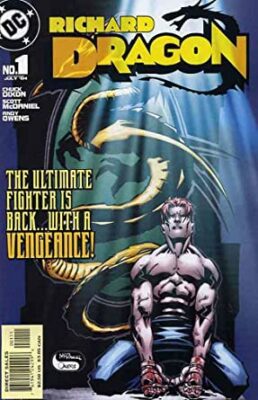
Alex Grand: Wow. Right after 9/11, gosh. And that’s still not a good excuse, Chuck.
Chuck Dixon: Yeah. It’s like you should have tried to come into the city. I had said something in an interview. And I was told that I had by Paul Levitz, that I had to call and apologize to this editor and until I apologize to him, I couldn’t get work at DC. And so I called and I said, “Look, I’m not going to apologize. I stand by what I said in the interview. Now can I come back to work?” And he didn’t have the cojones to say no. So, I did Richard Dragon, I did Nightwing year one, and that was pretty much it for a long time.
Alex Grand: Oh, wow. Okay.
Chuck Dixon: And then I was in the wilderness.
Alex Grand: Yeah. Because now you have Devil’s Due Publishing, Moonstone Books, Bongo Comics: Simpsons at this point.
Chuck Dixon: Yeah, Bongo carried me a lot…
Alex Grand: So, that was a bread and butter type of job there for you?
Chuck Dixon: Yeah, yeah. I mean, I enjoyed the work and it was challenging, but they paid double page rate. So, they certainly really did help out there.
Alex Grand: Oh, that’s awesome. So, you’re able to make a living. And then how long were you doing that for Bongo Comics?
Chuck Dixon: Oh, boy. I forgot when the wheels came off there. They changed editors. And me and Sergio Aragones got fired. So, at least I was in good company.
Advertisement
Alex Grand: Yeah, that’s true. You’ve met and talked with Sergio?
Chuck Dixon: Yeah, yeah, I met Sergio at a San Diego Cons mostly because my youngest son is a huge fan. We got to talk quite a bit at one of the San Diego Cons. Actually, that’s when I found out that he was fired at the same time I was. So, I felt a little better about it.
Alex Grand: Aren’t you both 6’3?
Chuck Dixon: Yeah, I think… Yeah, I think so.
Alex Grand: Yeah. Gosh, I mean, I’m 6’1. I thought I was tall. But you guys are definitely… So, to see you too, that’s literally two giants in the comic industry.
Chuck Dixon: I thought I was. Also I met Adam Baldwin. You ever met that guy?
Alex Grand: Uh-uh
Chuck Dixon: That guy is so tall it’s ridiculous.
Alex Grand: Really?
Chuck Dixon: Yeah.
Alex Grand: Because you can’t tell this stuff on TV.
Jim Thompson: You’re 6’1 one.
Alex Grand: Yeah.
Chuck Dixon: Wow. ‘Cause I’m only 6’2. Why am I so much taller than you?
Alex Grand: Well, on the webcam, you mean in person?
Jim Thompson: Yeah, when we stand next to each other. I’m just surprised that there’s only one-inch difference.
Alex Grand: Well, I need to straighten my back. I’m at the computer too much. All right, so now that being said, let’s talk about how tall you are some more. No, I’m just kidding. So, then in 2006, you worked on Transformers, Evolutions miniseries. So, it looks like you can basically just kind of do whatever property comes your way. You got to make a living and you can basically write anything at this point?
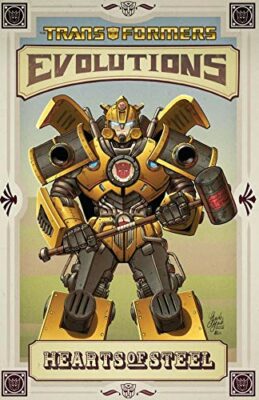
Chuck Dixon: Well, yeah, I mean, as long as I’m interested in it. I mean, I never say yes to any job. Like I said, I didn’t say yes to Robin immediately, I wanted to make sure I could contribute and that it was a good fit. But you know, I’ve had jobs where they go, we want you to do this. And so we have this other guy that’ll probably do a better job than me. So, Transformers, I was only able to do it because it was set in the past, and was kind of not really an Elseworlds but because I knew how rabid Transformers were. They are enthusiastic to say the least. So, I was very careful on that one like, I didn’t want to do them wrong. I wanted to do something they would like.
Alex Grand: Yeah, that makes sense. And we, actually Transformers fans, because I was a kid with transformers and I’m part of that. See, we had our own little Jesus Christ resurrection moment when Optimus Prime was killed in the movie, and then he came back. We all cried, and then we all rejoiced. We went through this though. So, we came out rabid fans and that ever since so that’s true. Okay, Jim, go ahead with WildStorm.
Jim Thompson: Okay. So, in 2007, you were doing stuff for both. Were you doing stuff for both WildStorm and for Extreme to both of those prints because you did Prophet for Extreme?
Chuck Dixon: Extreme, what was I doing for Extreme?
Jim Thompson: Prophet?
Chuck Dixon: Oh, I think that’s a lot earlier.
Jim Thompson: Oh, is that earlier?
Chuck Dixon: Yeah, that’s earlier.
Jim Thompson: Okay. I wasn’t sure when that–
Chuck Dixon: Yeah, that’s the 90s.
Jim Thompson: Oh, in Team 7, that would have been… When was that?
Chuck Dixon: Well, Team 7 was in the 90s. And then I came back and did a Team Zero for WildStorm in the 2000s.
Jim Thompson: I see. Okay, that makes sense. And then you were doing Grifter/Midnighter?
Chuck Dixon: Yeah.
Jim Thompson: Now, let me ask you about that because you’ve made comments about you don’t like when characters are changed. But you don’t have a problem when they’re original. Now Grifter and Midnighter and their relationship, you don’t have any objection to that or to writing that as them as a couple, do you know?
Chuck Dixon: No, because that’s how they were written.
Jim Thompson: Right. Right. Which I think people miss that it’s if you’re having to write suddenly Bobby Drake, Iceman is gay or something, that’s a different thing for you. So, it’s not that you don’t like gay people in terms of–
Chuck Dixon: It’s not that I don’t like gay people. I don’t like my favorite characters changed. You know, if you were to say okay Two-Gun Kid is a Mormon, well knows that.
Jim Thompson: He’s Jewish, which I don’t understand.
Chuck Dixon: Yeah, yeah, yeah. It’s like Black Panther is Dutch now. What? That doesn’t make any sense.
Jim Thompson: Were people surprised that you were doing Grifter/Midnighter? Did people get mixed up and think that you have these preconceived prejudices on some things that you don’t actually have?
Chuck Dixon: Well, I think people were basically– Well, the people who care about this kind of nonsense, were totally dismissive. Like it didn’t happen because it didn’t fit the template for me. You know, he would never write a gay character because he hates gay people. And it’s like, okay, well, if that’s what you believe, that’s what you believe. And I thought I did a good job. I wrote Batman and the Outsiders, they were two lesbian characters and they were established as lesbians. And I thought I wrote some pretty touching scenes for them that made sense to me. But you know, I didn’t get any attention from the right people, which I don’t care about their opinion anyway, but I didn’t get any attention from them because it didn’t fit the template.
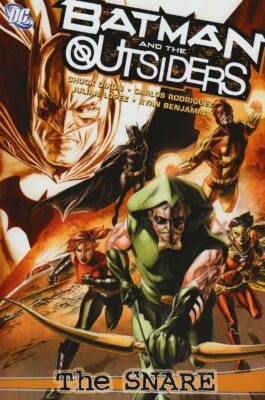
Jim Thompson: Now, the letter’s page, did people complain, did they jump the gun and say, oh, don’t let him do this? Or it was only no one really paid any attention?
Chuck Dixon: Well, back then there was a lot more perplexing about me. I mean, if you googled my name, homophobia came up for the first three pages. Now, it doesn’t anymore. My name is not attached to homophobia anymore, thank goodness. But you know and I never made any effort to separate it from it. I got my opinions, touch my work by my work. But yeah, there was a lot of nastiness. A lot of times on the internet if you want to find the nastiness, you got to go looking for it, nobody really cares.
Jim Thompson: Right. But it’s there on all sides.
Chuck Dixon: Well, it’s there on every subject. I mean, you post the free kittens to a good home and you know, six posts later, you’re being called a racist.
Jim Thompson: We’ve had Howard Chaykin on this too. And he–
Chuck Dixon: Well, there you go. There’s a lightning rod. You never know what’s on his mind.
Jim Thompson: All right. So, you got connected you were doing DC stuff. And then you announced that you were officially not employed by DC Comics.
Chuck Dixon: Yes.
Jim Thompson: What were the circumstances surrounding that?
Chuck Dixon: I have no idea what was going on there. They brought me along for Robin to have the Return of the Spoiler. And then I was up at the DC offices, I stopped in to visit because I was seeing other publishers, did like a three-day thing in New York where I was going around different book publishers with some projects. I stopped in DC and Dan Didio just gets this wild idea and decides to offer me Batman: The Outsiders. And they’re going to ditch the issues that were written by boy… Maybe, Tony Bedard, I think. They’re gonna ditch those issues and just start it over again with me. And I’m like, okay, I literally started writing that day. I said, “Do you have an office that nobody’s using?” And I started laying stuff out. Everything seemed fine and everybody seemed happy with both Robin and Batman: The Outsiders and then the micromanaging began. The, can you change this, can you change that? And then I got introduced to the whole post-production aspect because these things were reproduced digitally, they could move things around. Something they could never do before with comics, and there was a whole lot of that going on. And I put up with it, and I had no problem with it and rewrites, whatever. Yeah, let’s do this. And I thought everything was really going well. In fact, I had done a store appearance, signed a whole bunch of Robins. And I really thought, “Well, I guess I’m back in DC now.” And the next day I get the phone call. “You’re outta here, stop working. Your services are no longer required.” My assistant editor was like fighting back tears when she talkd about this. Why did this happen, they were not allowed to tell me and to this day, I don’t know what I did wrong.
Alex Grand: Wow, what the heck?
Advertisement
Chuck Dixon: Yeah.
Jim Thompson: No one’s been able to tell you?
Chuck Dixon: No one has ever told me why I was fired off those books. And the thing is, I, as always was so far ahead of schedule, that they literally left like $30,000 on the table because I was way ahead of most books. I had this whole thing with the moon and the Batman Outsiders and Aquaman lined up, I was dying. Well, I did write it. But they will never be seen.
Alex Grand: You could always change the names of the characters and just make some original things.
Chuck Dixon: I will someday.
Alex Grand: Yeah. Yeah, I do that with a lot of stuff.
Jim Thompson: And were you embroiled in any controversies at the time? Was there something that you were a lightning rod that they were looking to avoid?
Chuck Dixon: No, no, they knew everything about me. They were going to know. You know, I was a conservative. Yeah. And it’s never in my work, or I don’t think it’s in my work. I wasn’t up there all the time because I was living in Florida. Yeah, I don’t know. I mean, I don’t know what I did.
Alex Grand: And there was no Pee-Wee Herman movie theater episode?
Chuck Dixon: No, no there was absolutely–
Alex Grand: None of that stuff. Okay.
Chuck Dixon: Well, I don’t know. I mean, given some of the staff members at DC at the time I was there, that might have been a plus, I don’t know. Well, there were some real weirdos there.
Jim Thompson: So, this would have been let’s see before the new 52?
Chuck Dixon: Oh, yeah. Yeah, I missed– I dodged that bullet.
Jim Thompson: That’s a phrase I was going to use because that was a dark time. So, let’s talk about a few different projects, and then I want to get a little bit on one other matter. You got hooked up with Dynamite and you finally, you actually got to do a spaghetti western in all its glory with The Man with no Name, correct?
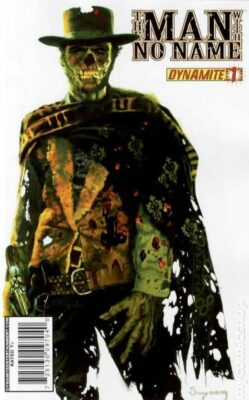
Chuck Dixon: Yes.
Jim Thompson: And how was that? Was that fun to do for you?
Chuck Dixon: Once I got the artists they wanted, they were going to hand me what the original artist in the series. I said this guy can’t draw horses or hats. Why is he drawing western? And I said, let me work with Esteve Pols. Like, I don’t even remember where I first saw Esteve’s work. But they were amenable to hire. And then I was happy, happy, happy.
Jim Thompson: Who was the first artist? I am not not saying names to be mean. But I don’t know.
Chuck Dixon: Oh, I don’t know. I don’t know who it was. I don’t know his name. But it’s just, you know, I said, I can’t write a western with this guy. No, I need somebody that comes through all the stuff that is required in a western.
Jim Thompson: Because I know it wasn’t Frank Avila doing covers?
Chuck Dixon: Maybe.
Jim Thompson: That were beautiful. I mean–
Chuck Dixon: Sergio Cariello did my covers.
Jim Thompson: I remember those as well, too. They were great. Do you wish you had gotten to do more of that, to do more westerns? You haven’t gotten a very many, but they’re all, I really enjoy them.
Chuck Dixon: It’s my favorite genre, because I finally got to do a Lone Ranger with Esteve Pols of Dynamite as well. I mean, yeah, I could write that stuff all day. I mean, just finished writing a western prose novel. So, it’s my favorite genre, but in comics, it’s not that popular. That’s why when you see westerns in comics, they gotta throw in zombies or something else to attract the readership.
Jim Thompson: You went to G.I. Joe for IDW?
Chuck Dixon: Yeah.
Jim Thompson: All of this seems like it’s in your wheelhouse in a way that you’ve, after leaving DC got to do some things that you really like to do.
Chuck Dixon: Yeah, yeah. I mean, when I heard IDW was getting the G.I. Joe license, I got a hold of Ted Adams and I said, “Hey, would you consider me?” And he goes, “Don’t worry. You’re first on the list after Larry, obviously.” So, yeah, I got to do quite a bit and getting to work off of Larry’s stuff, that was very, very cool. Yeah, but I have been able to do a lot of just what I want to do, and with E Comics and crowdfunding and everything else, the gatekeepers are gone. You just do what you feel like doing.
Jim Thompson: Yeah, I want to talk about crowdfunding a little bit, but how long did you work on G.I. Joe?
Chuck Dixon: Oh, boy. I think I did like 40 issues and one title and then a bunch of minis. I probably did like 60 issues of different G.I. Joe things while I was on it. Yeah, I was just getting into it.
Jim Thompson: And did you leave just because you were ready to leave?
Chuck Dixon: I think they changed, they wanted to change direction or something like that. So, I canceled all the books and then started them up again later with different people. You know, and I ran into what I always run into, which is I’m the Invisible Hand writer, the writer nobody notices. And they would get rid of me and they keep a guy who was quote-unquote “a fan favorite” or have gotten some critical acclaim, even though my book sold them. I ran into that all the time.
Alex Grand: And that’s kind of like an ivory tower mentality a little bit.
Chuck Dixon: Yeah.
Jim Thompson: And what about Expendables and your relationship, working relationship with Sylvester Stallone? Tell us that from beginning to end?
Chuck Dixon: Well, that is simply the weirdest thing that’s ever happened to me. It continues to be a story I can’t believe myself. I did an Expendables comic for Dynamite. It’s a prequel comic, a prequel to the first film. So, they sent me the screenplay, and I worked on it. I enjoyed it but it’s kind of weird working on a thing that you’ve never seen the movie, you know? And it came out and then a few months later, I get a phone call, and a woman says, “Will you hold for a call from Sylvester Stallone?” I’m like, “Okay.” So, he gets on the phone, and he tells me how much you love the comic, how much he loved the dialogue, and how I got it. I got what he was going for because he wrote the movie. And he said, “Would you want to come out here and have a meeting to help me on rewrites for Expendable 2?” So, I’m like, “Yeah.” So, I went out and nothing really came of it. I mean, I got to meet him, sit in a production meeting, and throw my ideas out there. And it was cool because he and I were finishing each other’s sentences. We immediately had a working relationship. And then they just simply, they didn’t want me so they offered me a really lowball figure for rewrites and it would have been like comic book money. And I wanted Hollywood money.
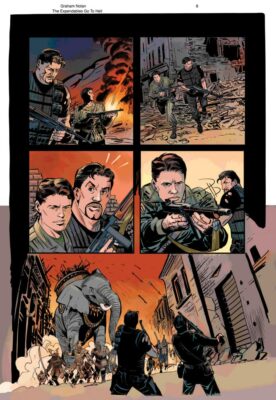
So, I said, “No.” Well, the weirdest thing is that Sly, it’s just like comic Sly, Sly didn’t forget me. He kept thinking of me for different things and he got me to work doing web content for Lionsgate. He got me work doing dialogue on an Expendables video game. And then eventually, when he formed his own production company Bell Bow Productions, he auctioned my novel series, Levon’s Trade. And I just this past week got the screenplay for the first episode which he wrote. So, that’s moving ahead and we’re working on that.
Alex Grand: Wow. Which Sylvester wrote himself?
Chuck Dixon: He wrote it himself.
Alex Grand: Dude, that’s cool. That’s awesome.
Chuck Dixon: I was flabbergasted. Every time he did and Expendables movie, he would talk to me, he would call me, and we would just like shoot the shit about Expendables. And he said, “This movie, I really want to make all Expendables go to hell, but nobody will ever greenlight it.” And I said, “Well, what happens in it?” He goes, “The Expendables die, and they literally go to hell and fight the devil. I said “nobody’s ever gonna make that movie.” That’s crazy. I said, “But, you know what? That would be a fantastic comic book.” And so we talked about it and things went on, and then it suddenly struck me, Richard Meier is like a crowdfunding king. He’s the biggest Expendables fan I’ve ever talked to in my life. So, I called Sly. I told him Richard’s background. He was a marine. He was in the army. He was actually in combat in Afghanistan and Iraq and he’s an Expendables fan, we want to do a comic book. And Sly said, “Go ahead. Do it. Do whatever you want.” And so I called Richard and I said, “Richard, sit down. I want you sitting when I tell you this.” And for the first 15 minutes, he didn’t understand that I meant the actual Expendables. And when it finally hit him, he’s like, “Oh, my God. You mean, the actual, not like The Expendables, the actual Expendables we get to do a comic book of these guys?” I’m like, “Yeah.” And then that afternoon, I had the first five pages written, by Friday, we had art from Graham and we were off to the races.
Jim Thompson: Is Stallone the only one that you have license permission in terms of looking like the characters, or?
Chuck Dixon: Yeah, there’s only certain ones we have the license of. When you see the graphic novel, we have the Mel Gibson character in it, but it doesn’t quite look like Mel Gibson, we don’t have a license. We have licenses for the core Expendables; Jason Statham, and Jet Li, and Dolph and the other guy.
Jim Thompson: I see. Airboy came back. I want to close with some of those things. You did a couple of issues of Airboy last year. Is that right?
Chuck Dixon: I did the one. Yeah, I did like an issue 51 that wraps the story up from the Eclipse days.
Jim Thompson: I don’t think we made clear, when it ended it left in a cliffhanger, correct?
Chuck Dixon: Yeah, yeah. Davey has disappeared. Basically, he planted an atomic weapon in misery’s universe, it goes off and we never see Airboy again.
Jim Thompson: You did Snakes on a Plane?
Advertisement
Chuck Dixon: Yeah.
Jim Thompson: Did you think that was gonna be a big seller?
Chuck Dixon: That was like a last-minute thing from Wildstorm. Literally, they decided, like a month before the movie was coming out, they wanted that in the comic book. And I had the turn to Scott at Beatty. Scott Beatty did a lot of writing on that, ghostwriting because there was just no time. And we basically had the right issues one and two simultaneously.
Jim Thompson: Now, this is the last part of that I want to talk about and it’s tricky, but I’m a lawyer. So, I’m going to put on my lawyer hat and try to do it. I’m almost mad at you to be honest because this is as easy and just as normal and interview as everyone that we do every two weeks. Everything you’ve talked about sounds like everybody else. And I have tremendous respect for you as a writer. But we know going into this, that we’re going to have people that aren’t going to be happy that we’re doing the interview, were going to be unhappy that I’m having this conversation with you. There is a no-win aspect to doing this one that’s different than virtually anybody else that we’ve done. And so I’m just getting that out there, and I apologize for it. But you must realize that there is an aspect back to this that’s different from other people’s.
Alex Grand: And just to throw out one quick aside, is that also that I love your stuff as well. I would say that I’ve seen like old interviews with you from the 90s that you’re very much a proponent for the CBLDF and for freedom of speech and comics. I just want to throw out there that I respect that. Now carry on.
Jim Thompson: Thank you. And so I just want to make it clear that we’re not going to please anybody this way. And so I hope I don’t displease you by asking you questions on this. It’s not an attack. It’s just, is there any directions or statements you made that you, even if you think you were right to make them, you wish you hadn’t done it because of the difficulties that have come from that?
Chuck Dixon: Not really. No. I stand by what I said.
Jim Thompson: That was totally the answer that I expected.
Chuck Dixon: Yeah.
Jim Thompson: So, let me ask you about some of them, particularly. But first, I want to draw back to the very first thing I talked to you about because I think it’s interesting. You said in the very first comics panel, comics convention, you listened to Alex Toth. And you said that he basically ripped the industry a new one for 45 minutes or so. When you were listening to him, and you were how old?
Chuck Dixon: I was probably 17, 16 – 17 years old.
Jim Thompson: What were you thinking while he was talking? Were you going, “Yep, you’re right.” Or were you thinking, “I like comics as they are”?
Chuck Dixon: I was like every other fan in the audience. I was aghast because these were fans and fans don’t get critical like this. And he didn’t talk in specifics. He didn’t attack any one creator or comic company. But he did talk about his experiences with editors, and restrictions and things like that. And my mind kind of opened up, that yeah, comics could be better. You know, and they were actually on the verge of becoming better. You know, there were some incredible comics done in that period and following it, shortly following. He kind of tapped into the Zeitgeist.
Jim Thompson: When you’re listening to yourself talking and criticizing certain aspects of current comics or certain creators that are now on titles that have reputations elsewhere and so forth; do you ever hear yourself and think, “Oh my God, I’m Alex Toth now.”? That the circle has come around for you sitting in that audience to you being that older person complaining about the state of comics today?
Chuck Dixon: All of that. I think as you get older, you become a bit of a curmudgeon. But you know, it’s not about like the good old days or we did it better, or anything like that. It’s just, I see the same mistakes being made now and double down on that I’ve seen the entire time I’ve been in the business as a professional.
Jim Thompson: My next question is one of the things that you have spoken about is changing characters or introducing characters. I want to make sure that I’m not misquoting you on this. Do you have an issue with the Muslim version of Miss Marvel?
Chuck Dixon: Just that it’s boring.
Jim Thompson: Okay, you don’t like the comic?
Chuck Dixon: I’m probably the first American comic creator to introduce a Muslim character. I had a detective in Nightwing who prayed five times a day to Mecca, and he had a prayer mat in his office. I mean, I wasn’t doing it to be edgy or diverse. I was doing it because I grew up in a city and cities have lots of different people in them that could add an element of, I don’t know, interest to the character. So, I have no objection to Muslim characters. But you gotta portray them honestly and interest– And my problem with a lot of these, their token characters. Let’s face it, we’re going to do this character because they’re Muslim or they’re a lesbian or you know, whatever. And that’s as far as you go with. You don’t do anything to make them more interesting than that.
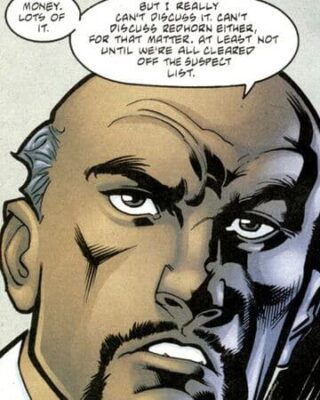
Jim Thompson: Do you read that comic?
Chuck Dixon: I’ve read some of it. It just seems uninteresting to me. And a lot of it is simply the craft is missing and the writing and the artwork.
Jim Thompson: But you’d acknowledge it’s not written for you as–
Chuck Dixon: No, no, no. You know, a lot of things aren’t written for me. I mean, Neil Gaiman doesn’t write for me. But I recognize that Neil Gaiman is extraordinarily talented, and obviously very popular, but me I have no interest in his work, but I acknowledge that it’s good. And it’s earnest and he likes his audience.
Jim Thompson: She is a popular character in that there’s talk of bringing her into the Marvel movie universe and so forth. Or do you think that’s not because she’s popular, but because there’s a different agenda?
Chuck Dixon: There’s a different agenda because as soon as she was popular, her sales would reflect it. It’s like Netflix. Netflix is awesome because it reveals the truth of the universe. Because the people at Netflix can actually see who was watching, how many people are watching. They have basically sidelined every agent in Hollywood because they can go, they’re not popular. Your client is not popular and we have the numbers. So, you gotta have the numbers. If this Miss Marvel was a breakout character and huge hit, I would go, okay, well that’s just the way it is. And I don’t get it. I mean, I didn’t get the Ninja Turtles you know?
Jim Thompson: Yeah, I never got it. You understood the radioactive hamsters because you did that book?
Chuck Dixon: Well, I eventually understood the turtles, I just understood they weren’t for me. I don’t know why I didn’t understand it because it was right there. Their buddies, they live in a sewer and eat pizza all the time and fight crime. I mean, okay, yeah, why wouldn’t kids love that?
Alex Grand: Turtle power, turtle power guys.
Jim Thompson: The next one, and there’s only a couple of these but I just– Tor was a good seller. We knew it was going to be temporary. And for Alex, who’s resistant to some of this stuff, sometimes read all of that, he enjoyed it. I thought it was great. I like the entire run by that author going back to the one arm Tor and the different ones, and the Jane Foster one. Did you read those or did you just not like the concept of that happening?
Chuck Dixon: I didn’t read it. I understood it was temporary. And I don’t know if I was critical of that. I don’t remember being critical. I wouldn’t know enough to be critical about it.
Jim Thompson: And Miles Morales, who you have criticized. And he’s not the same Spider-Man. Did you see Spider-Verse?
Chuck Dixon: No, I haven’t. I haven’t. I just think like a DC it’s a dilution of a character. You’re diluting, you’re confusing your audience by creating these different entities with the same name.
Alex Grand: I would say that and I get that point. The only thing is that, like Marvel in the 80s with Iron Man, they had Roadie or I think in the early 90s, they had Roadie, also kind of wear the Iron Man suit. Actually, it was the 80s and 90s, and then it became a war machine. And I thought that was a lot of fun. And Miles Morales, I really recommend watching the movie not from a perspective of okay, this person gets representation. It’s about time, it’s not like that. But it’s actually really just a fun urban story in that it’s just a different universe and the spider bit someone else, and then the mainstream Peter can meet that spiderman. And they do have actually some fun interactions. And if you look at it more as like an urban story, I think you’ll like it.
Jim Thompson: And Jon Stewart also I mean, not just Roadie but at the same time, you have Jon Stewart, which for an entire generation is their Green Lantern because he was on the cartoons.
Chuck Dixon: I was gonna say that Iron Man and Green Lantern, I was gonna specifically mention Jon Stewart, they lend themselves because anybody can be in the Iron Man suit, anybody can adopt the ring. And that’s the beauty of those two series is that it doesn’t always have to be that guy. But Clark Kent always has to be Superman, to me, Peter Parker always has to be Spider-Man. I’m just hidebound that way.
Jim Thompson: So, tell me about the 2014 op-ed you did in the Wall Street journal.
Chuck Dixon: It was written by myself and the artist Paul Rivoche about a creeping politicization of comics mostly to the left wing end of things, and how anyone who thought differently was being ostracized out of business; either being unemployed or underemployed. There seemed to be a real war on any kind of diversity of thought within the comic book community.
Jim Thompson: So, did you want diversity? Or did you want a backtracking to where comics weren’t in general political one way or the other? Because you certainly became politicized more so in terms of your work rather than less?
Chuck Dixon: Well, I don’t want diversity of opinion in the comics. You know, I don’t want somebody saying, well, you can’t work in comics because you’re a Seventh Day Adventist, you know, because of who you are at home. Yeah, I want comics, mainstream superhero comics to be apolitical. But I mean, any other– you want to produce a political comic, go right ahead. But don’t make Superman espouse your beliefs.
Jim Thompson: So, was Airboy a mistake when you first started doing it?
Chuck Dixon: No, because it was kind of wild and wooly, and presented both sides. Because that’s the way the creators were. It was a different era, plus he wasn’t a character most readers were familiar with. We weren’t taking– I mean Airboy was political back in his day. I mean, he killed Nazis, he killed communists. We weren’t taking an established character and making them into what we wanted them to be. We were continuing what they already were.
Jim Thompson: So, did you ever tell Denny O’Neil, “Man, you screwed up the entire existence of comics with Green Lantern and Green Arrow?”
Chuck Dixon: Oh, yeah. Oh, yeah.
Jim Thompson: That’s what I wondered.
Chuck Dixon: Denny and I got along great and we were always honest with each other. I would absolutely astonish him with things I said. And I said you know, boy, I hated those comics. I really hated those comics. In fact, when I was on Guy Gardener, I wrote a scene that Kevin Dooley made me take out. And it was a parody of a scene where the black man comes up to the Green Lantern and basically admonishes him for helping, you know, the purple people and the orange but what are you going to do to help the black people. And I did that exact same scene and – was gonna draw it exactly the same way. Except Guy Gardener’s response is “Get a job.” And they wouldn’t– Kevin’s like, that’s one, that’s a step too far.
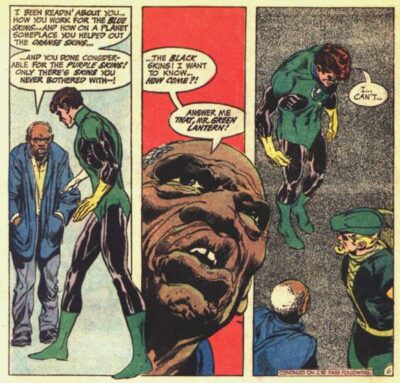
Jim Thompson: So, there’s actually something Kevin Dooley would say don’t put in a comic which–
Alex Grand: Yeah, because we talked to him and he’s stuffing girls in refrigerators in some of his stuff.
Jim Thompson: He almost made me cry at the comic fest.
Chuck Dixon: I mean, I was gonna go up and be there when Danny first saw that page. I wanted to see his face.
Jim Thompson: All right. So, let me ask you another question. Do you identify yourself– If people ask are you part of Comicsgate? Are you sympathetic to– I know, it’s just a name to some degree, you have defined it in interviews and you’ve talked about it. What is your relationship with it if you even want to acknowledge that it is a thing?
Chuck Dixon: I am the Jesus of Comicsgate. I was the first one to come out and I was all by myself. So, I paid for all their sins for years and years and years. And then others stepped out. Others got ostracized and stepped out. So, Comicsgate I see as basically a pejorative, insulting pejorative to– It’s like Neocon, whatever.
Jim Thompson: Social justice warriors, which is–
Chuck Dixon: Yeah, whatever. Yeah, I agree with you. And I don’t really understand what Comicsgate is. I think it’s different in the eye of the beholder. And then I see a lot of Comicsgate people are like infighting with one another, which always happens on the right, we never get along with each other. Everybody’s got a different opinion about things and I kind of just, I don’t just stay above it, I just stay out. I don’t know who’s arguing about what or who believes what. I was the first one out there.
Jim Thompson: And do you think it went in directions that you, like anything that someone starts or acknowledges; are there aspects of it they you don’t agree with? And people that identify themselves that way that you think, well, I wouldn’t behave that way or I think that’s unfair, or you, in general, satisfied with their side of things?
Chuck Dixon: Well, it’s kind of a libertarian point of view. I mean, they’re going to do what they’re going to do. I can’t really be critical of it. You know, if people did it on the left, if people decided to do left-wing leaning comics, self-funded, have their own characters; I’d say God bless you. I’d probably read them, you know, just don’t do it with established characters. Go do it on your own. Take the risks that we’re all taking. So, yeah, I mean, comics is such a raw medium; write a story and you draw it. It’s literally words and pencils on paper. It should be freewheeling and crazy and everybody just presenting whatever the hell they want to do. That’s the way it should be.
Jim Thompson: What about some of the behaviors, though, in terms of online bullying? You guys get it too. I’m not saying that– You certainly have received that kind of treatment. But some of the incidents that, and I’m not going to go into them, you know the things I’m talking about. But were there anything where you’ve thought I should just say to somebody that respects me for starting this, that that’s probably not nice to do to people?
Chuck Dixon: Yeah. You see, the thing is, I mean, when you say, I probably already know this, I probably don’t know it. I mean, it’s like, somebody come on up to you and say, “Did you hear what Debbie said at the mall yesterday?” I was like, “No, I wasn’t at the mall. And I’m not even sure who Debbie is.” Because the internet is so freakin’ huge. Social media is so freakin’ huge. So, a lot of times I’m way, way, way far from the battlefield. And I don’t even know what’s going on. And when people try to tell me I’m just like, I’m not even really interested in hearing this. So, is there a lot of nastiness and sniping on the Internet? I mean, big surprise. I mean, all you can do is massage your own experience by blocking people or limiting people’s access. You know, I don’t go on the internet fighting with people all the time, because what’s the point? Like I’ve work to do.
Alex Grand: Yeah. One thing I want to just kind of throw out there. And then Jim will resume his thing is that we’ve had guys like Don McGregor, Howard Chaykin. And they’re very much on the left as you are on the right, but they speak their minds. And they definitely feel ostracized from the modern comics industry, as well for their own reasons. So, they don’t really fit that template of not being in it because of their political preference. To me, it’s, and maybe you can speak more to this. But maybe that’s not a thing. Maybe it’s more an age discrimination sort of problem. Or maybe the younger generation just doesn’t know some of these older guys, so they don’t know– So, they’re just like, well, that’s not the hot new thing right now. So, maybe it’s something more like that.
Chuck Dixon: Well, you’re right. Because I’ve learned over the years that politics is part of it. But it’s not all of it, that there’s definitely cliques. I mean, until Dan Didio left DC, you had the two major comic book companies were run by the guys who hung out at the same comic book shop when they were teenagers. So, they were a clique. Marvel and DC were part of the same clique. And I realized years later that it wasn’t just my politics, because a lot of them didn’t care about politics. They just had politics that they had learned and they knew and were comfortable with. They knew all they needed to know, in their opinion. But you know, if you didn’t like the same music they like or the same movie they like. I mean, I remember at once a DC I was slightly critical of a movie that an editor liked, and the guy just blew up. Because I didn’t.– I said, “Well, I like the movie. I just don’t like it as much as you do.” And the guy just wouldn’t let it go. So, it’s more than that. And yeah, Don McGregor and Howard Chaykin, we are not part of this new young clique, but that’s no reason why a lot of these guys are underemployed. I mean, the yardstick I use is that Jerry Ordway does not have a monthly title, either as a writer or an artist. And in that situation, there’s something wrong with the industry. Why would you allow that guy to be unemployed or underemployed in this medium?
Jim Thompson: And we could name others to that. I mean, some of–
Chuck Dixon: Well, yeah. I just use Jerry as an example. He’s an all-around, he’s good at both jobs, and at the peak of his powers.
Jim Thompson: Yeah, it doesn’t make sense. I agree. And some of the writers as well, you included that are consummate craftspeople and it’s frustrating sometimes.
Alex Grand: And then one last thing I’m just going to just throw that in then I’m done with it is, then the other thing is some of it’s generational. Like me and Jim, we have really different ideas about what our ideal Superman is. Like, he hates John Byrne Superman, I like it. He likes kind of Superman representing something more positive, and I get that. I think some of that’s generational. The one thing is about that Comicsgate that I hear about from friends and I have friends on both sides of it. But there was some, I forgot who it was, one of them that is associated with Comicsgate says they held up pictures of female editors from Marvel. They were like, it was a picture of like young like seven women– Yeah, right. They were like 20 something. And then they held it up to mock. And my only thing is that do comics that were originally supposed to be written for 12 to 18-year-olds, are they supposed to continue to appease older guys that collected at the newsstand in their local pharmacies? Or should they talk about trying to transmit it to a younger generation? How much of this is generational? And then also using that sort of belittling to then increase crowdfunding? It just seems like there was a bit of a technique that was kind of used to almost take advantage of some of those older dude readers that kind of wanted some of the old days coming back and utilizing some generational sexism to fill their bank accounts. What do you say about that?
Chuck Dixon: I believe it’s Richard Meyer we’re talking about and I don’t think that it was cynical in any way because I don’t believe that he was into the publishing end of it, might have been. But there is a huge number of disillusioned or dissatisfied fans who are not served by a lot of the output from the big two who are looking for something to support, something to like. So, yeah, I don’t think it was connected to –. I think it’s just Richard. Richard is unguarded, he says, what’s on his mind. And as to the generational aspect, that’s the biggest problem with comics is we lost the generation. When we left the newsstand, they were nowhere for kids to see comics for the first time, except maybe at the Public Library. Nobody goes into a comic shop cold. Some kid isn’t going to go, “Hey, I want to go into that comic shop.” He’s gotta see them somewhere else first, but where there wasn’t any place to see them. And as to aging fans, I’ve been talking about that for years. I mean, we need new blood in the comic book leadership every few years. It’s just like children’s books, you get new readers, new readers coming in all the time.
We haven’t had that in 20 years, nothing like that in 20 years or more. And so you’ve got the same guys reading them. I made a joke years ago that eventually, you’re gonna want Superman on a wheelchair, Batman with a walker, and we go, I’ll never want that. Yeah, yeah. Well, you’re going to when you’re 70’s reading these books, maybe you will. Maybe the only way you’ll relate to them is if these characters age with, which is where we get the darker, grittier, grimmer stories, the more cynical stories. And what kid’s gonna want to want to read that crap?
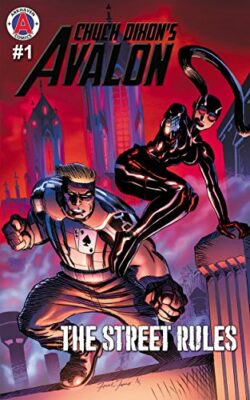
Jim Thompson: So, I guess that goes back to my line of questioning about Miss Marvel and Miles Morales that these are for kids of that age. They’re young characters, and they’re– And yes, they have names attached. Because let’s face it, if you don’t have a name attached, it’s harder to sell a new comic, it’s hard to have static and have it sell. Whereas it’s easier to have something like ultimate Spider-Man. And it certainly was successful in that the movie made a ton of money, and people saw the movie and now we’re going to go and buy. And so it’s good for the industry in that respect. I respect your view on that. I want to ask you one final question because Alex brought up somebody, but I want to bring up a different name, which would be Theodore Beale, who has a pre-existing as Vox Day. I think that’s a different thing to some degree. You have done or doing work for him on something that’s named Alt-Hero, which was the very name of it is inflammatory to a lot. It’s poking.
I don’t think that’s a coincidence that it’s named that way. And it does scare, maybe not the people that are going to traffic in those books anyway. But I just want to ask you about some of that because things like Daily Stormer as a title and I mean, these are names that are caused concern, but primarily, what has to stand with the people he associates with. And when Vox Day says that blacks are subspecies and half savages and that we have to secure the existence of white people, and a future for white children; comments like that don’t sound like the person I’ve spent the last hour and a half or so with. You know, and I don’t believe that. And you didn’t say these things. But when you’re working for somebody who does say those things, is there anything you want to say in response to that?
Chuck Dixon: Well, I did an interview with the Rolling Stone in which once they asked the same questions. And I’m like, why didn’t– I work for a lot of different kinds of people and nobody’s ever asked me about who I work with and what their personal opinions were. Nobody asked me who they were then. And a lot of interest in Vox. I understand Vox is beyond controversial. But he contacted me and basically set up a thing where I could do whatever I wanted. He doesn’t tell me what to write. He doesn’t tell me what they’re actually going to. He doesn’t touch my work at all. I’m free to do whatever I want. But he’s giving me access to a global audience that I didn’t otherwise have. And as I said to the Rolling Stone guys, I said, “What am I supposed to do? I don’t have your permission to work. I need permission from the right people to work. Am I supposed to get a job at Home Depot?” I mean…
Jim Thompson: And some of this is probably because ageism may have shifted you toward that, wouldn’t you say?
Chuck Dixon: Yeah, yeah. I heard that argument, it’s ageism. Well, if it’s ageism, it’s been happening since 47. And there’s other guys, you know, yeah, there are the guys my age out of work. There’s other guys my age still working. I don’t even agree with a lot of the stuff Vox says. I mean, I’m not politically in line entirely with Vox Day. He’s given me the freedom to work.
Alex Grand: Is it just you gotta pay your bills, so you got to work. Is that the deal?
Chuck Dixon: And also, interesting work. I like to work. I like doing it. It’s compulsive at this point. Every writer talks about burnout, it’s never been an issue with me. If anything, it’s the opposite. And I gotta have an outlet for this stuff.
Jim Thompson: Do you write knowing that his brand is all hero? Do you write with the notion of who his readership is? I know you have a character that wraps herself in a confederate flag.
Chuck Dixon: Yeah, but see, I don’t write that character. Alt-Hero is one title. I read a comic called the Avalon in that universe, and as a diverse cast. I mean, one of my heroes is Filipino. I’ve got a black cop, and he doesn’t say don’t do that, you know, make sure the cast is all white. Like every other urban comic, and it’s an urban comic that I’ve ever done, it represents the real world. Not for diversity as a virtue on its own, but just because that’s honest. And he’s never once said, don’t do that, or you should go in this direction or that direction.
Jim Thompson: I will say, as a lawyer, and only saying this because we’re having a good conversation, there are clients who I have handed their money back and said, even though they were money clients, I made good money, where I just said, I can’t do that. But I never do it just because they voted for or because they say something I don’t agree with or they watched a different news channel than me. But there are points where I say, “I can’t handle that.” And everybody has to make that decision. And I respect what you’re saying.
Chuck Dixon: And to be perfectly honest, I haven’t read a lot of this stuff that they say that Vox… I mean, I’ve read essays he’s written and stuff. I haven’t seen the kind of language you’re talking about. Nobody’s pointed out to me where he said these things. I’m not saying that he didn’t say them. But you know, with the dealings with the guy, I mean I talk to the guy a lot on the phone. We’ve got a good working relationship and I don’t hear this stuff from him, I don’t see any reason the part company with him. I don’t have a bad taste in my mouth when I work for him.
Jim Thompson: Okay. The only other thing I would say because you made the Rolling Stone comment, let me just say that Alex and I always ask people, what was Jim Warren like? Or what was so and so like. We do ask about what people think of their employers and what was it like to work with such… So, this would have been a question we, whether or not, controversial or not we often do that.
Chuck Dixon: Sure, sure. No, no. No, absolutely. I understand that. You know, you guys are curious about that stuff. I mean, you’ve asked me what a lot of people were like here and that’s fine. But you know, when the general mainstream media, their only interest, they’ve never shown any interest in me at all before. Now all sudden, they want to know everything about Vox Day. You know, basically, they don’t even want to know everything about him. They want to confront me with who they think is and how he respond to it.
Alex Grand: I would say that we’re not fishing for details on Vox Day. We want to cover your career. You know, as, as Jim and I discussed on the phone, we wouldn’t want to just omit. And we try to be journalists with this. That’s why we were very honest with Chaykin’s interview, and others that we’ve had. That’s where we’re coming from.
Chuck Dixon: It’s historians. So, I get it. Yeah. No, I don’t mind. I’ve courted controversy, and I’m willing to stand up to it.
Jim Thompson: And you answered every question I asked you, that’s all you can expect of anybody. And I appreciate it.
Alex Grand: Yeah, no pleading the fifth on this podcast, everybody. Well, Chuck, honestly, I had a great time. I think I could hear from Jim’s tone of voice that he had a great time too. Really, you are a true craftsman at what you do, you get into the universe, you turn in your stories on time, way ahead of time; sounds like more ahead of time than anyone that we’ve spoken to. If there’s one legacy, it’s that you’re always on time with your assignments, but you’re also just a great writer. I love the stuff you’ve written. I was a fan of yours in my teenage years. And I was all caught up in that 90s Batman’s Zeitgeist myself. So, it is nice to speak to the 90s Batman guy, as well as just I’ve read your stuff since, and before just because I got curious. You’ve been so gracious with your time and you’re just so brutally honest. And you’re really tall. So, that’s good. But thanks so much for joining us.
Jim Thompson: that’s the main take away. You’re taller than either of us.
Alex Grand: Yeah, yeah. But it was a pleasure chatting with you. Thanks so much for spending some time with us on the podcast.
Chuck Dixon: Certainly. Certainly. Thanks for having me.
Alex Grand: All right. Thanks a lot for listening, ladies and gentlemen. Stay tuned in a couple of weeks for the next episode of the Comic Book Historians podcast with Alex Grand, and Jim Thompson.
© 2020 Comic Book Historians
